How to onCommunicate isClearly() ?! Thomas ‘gossi’ Gossmann
A presentation at Ember.js Europe Q2 in June 2022 in Frankfurt, Germany by Thomas Gossmann

How to onCommunicate isClearly() ?! Thomas ‘gossi’ Gossmann

GOAL Improve communication within an interdisciplinary team WHERE I will shake and disrupt your naming skills WHY Trigger different ways of thinking for new vocabulary


Part I Why we are not onCommunicating isClearly() !

Why we are NOT onCommunicating isClearly() ! Bold Statement: - onPurpose onIntentionally inFullAwareness => Because of theLanguage we onUse

Developers speak … dev-lish - Dialects: - CRUDlish RESTlish FrontendLish BackendLish

Developers speak … dev-lish - Dialects: - CRUDlish RESTlish FrontendLish backend_lish

Example: A Developer in a Restaurant… “Hey <FoodOrderAndDeliveryProvider>, here is my onOrder handler and whenever you think I am isReady, please call it”
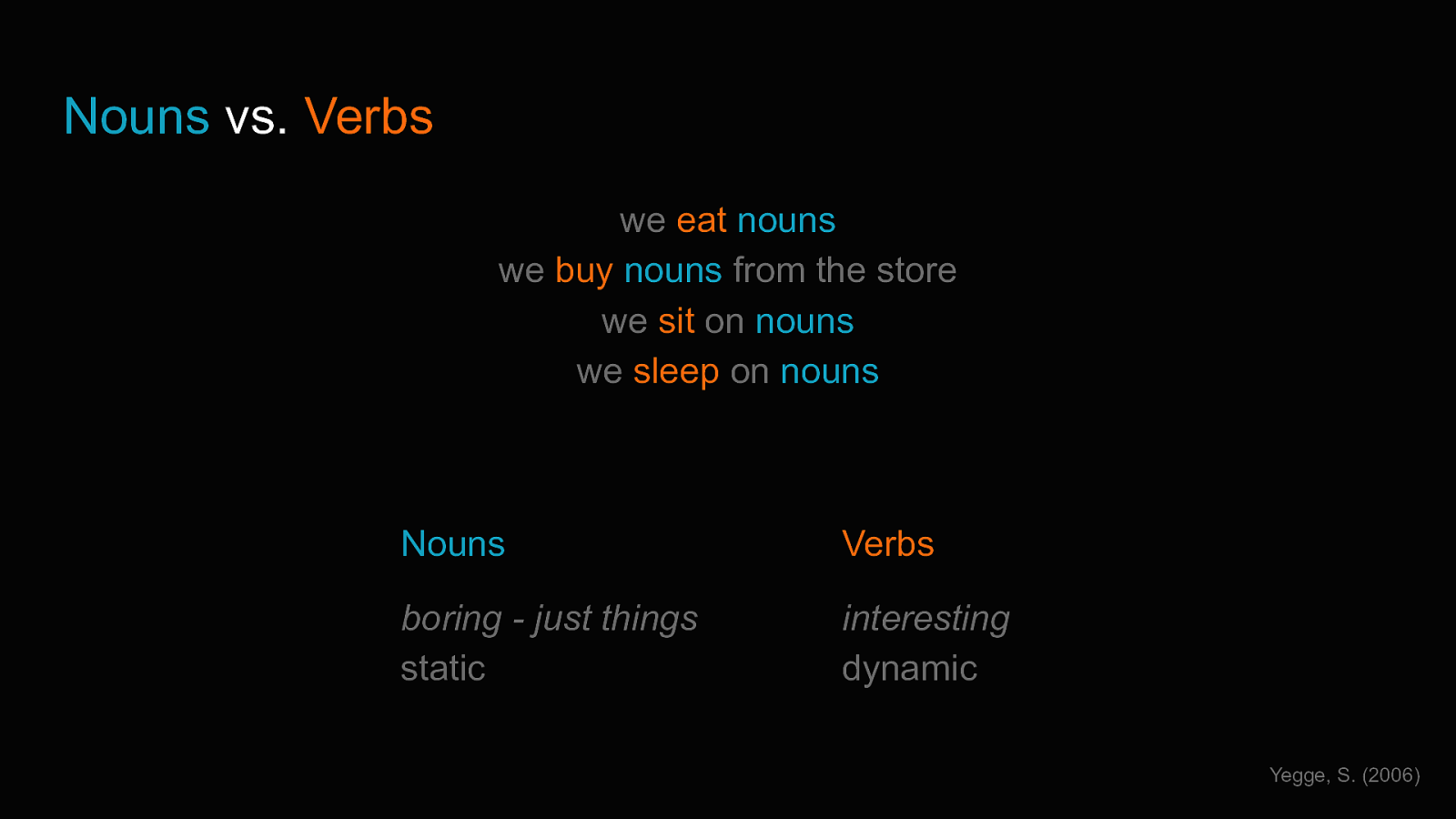
Nouns vs. Verbs we eat nouns we buy nouns from the store we sit on nouns we sleep on nouns Nouns Verbs boring - just things static interesting dynamic Yegge, S. (2006)
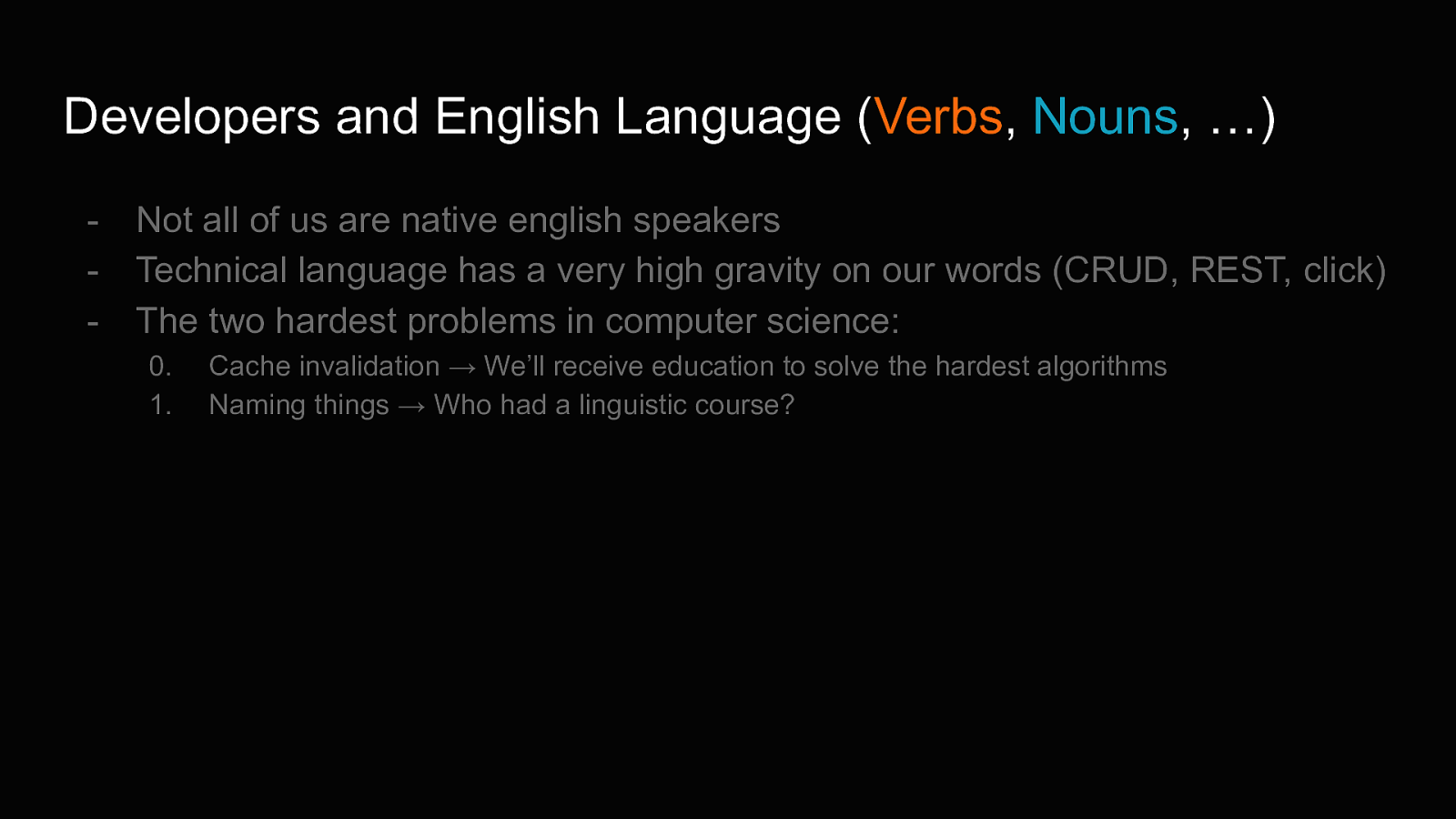
Developers and English Language (Verbs, Nouns, …) - Not all of us are native english speakers Technical language has a very high gravity on our words (CRUD, REST, click) The two hardest problems in computer science: 0. 1. Cache invalidation → We’ll receive education to solve the hardest algorithms Naming things → Who had a linguistic course?

Part II How to onDetect to isNotCommunicatingClearly() ?

Methods for Detection 1. 2. 3. The Sound of Code Find the Imposter Do you speak Domain Language? → The Trap we Built

Method 1: The sound of code? Sonofication of Code - Does the code tell a story? Is the story the same of the business/domain? Does the code sound wrong?

Method 1: The sound of code?
interface ThingArgs { thing: { isOn: boolean;
1.
onClick: () => void; // will set isOn to true
Underline self-named words
}; } export class ThingComponent extends Component<ThingArgs> { @action onClick(): void { this.args.thing.onClick(); } static template = hbs<Icon @icon={{this.thing.isOn}} /> <Button @onClick={{this.onClick}}> on </Button>; }

Method 1: The sound of code?
interface ThingArgs { thing: { isOn: boolean;
1.
Underline self-named words Thing onClick isOn
onClick: () => void; // will set isOn to true }; } export class ThingComponent extends Component<ThingArgs> { @action onClick(): void { this.args.thing.onClick(); } static template = hbs<Icon @icon={{this.thing.isOn}} /> <Button @onClick={{this.onClick}}> on </Button>; }

Method 1: The sound of code?
interface ThingArgs { thing: { isOn: boolean;
1.
2.
Underline self-named words Thing onClick isOn Connect the words in code execution order to tell a story:
onClick: () => void; // will set isOn to true }; } export class ThingComponent extends Component<ThingArgs> { @action onClick(): void { this.args.thing.onClick(); } static template = hbsonClick the button to onClick the thing to be isOn <Icon @icon={{this.thing.isOn}} /> <Button @onClick={{this.onClick}}> on </Button>; }

Method 1: The sound of code?
interface ThingArgs { thing: { isOn: boolean;
1.
2.
Underline self-named words Thing onClick isOn Connect the words in code execution order to tell a story:
onClick: () => void; // will set isOn to true }; } export class ThingComponent extends Component<ThingArgs> { @action onClick(): void { this.args.thing.onClick(); } static template = hbsonClick the button to onClick the thing to be isOn <Icon @icon={{this.thing.isOn}} /> <Button @onClick={{this.onClick}}> on 3. Find the Action: </Button>; }
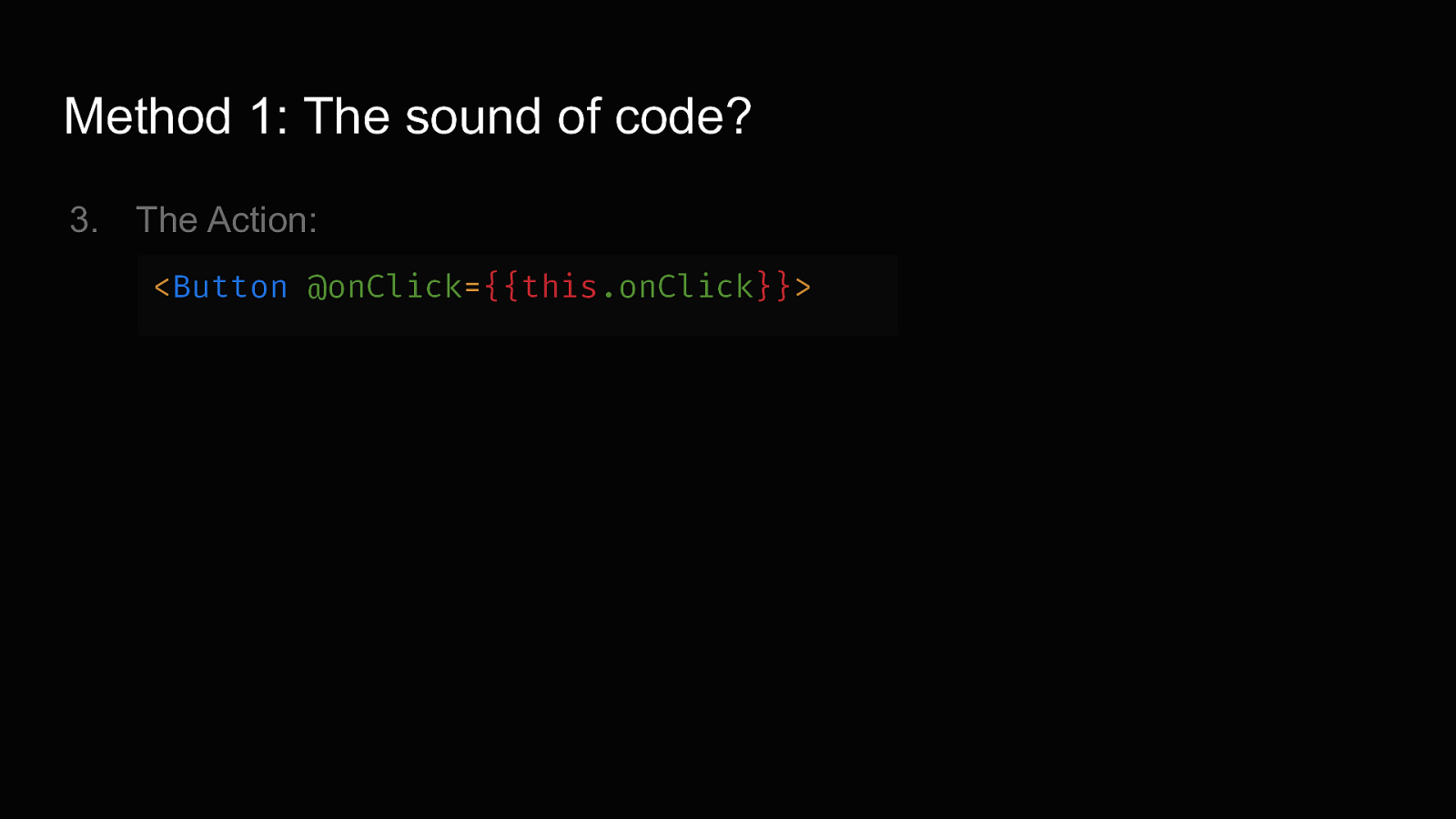
Method 1: The sound of code? 3. The Action: <Button @onClick={{this.onClick}}>
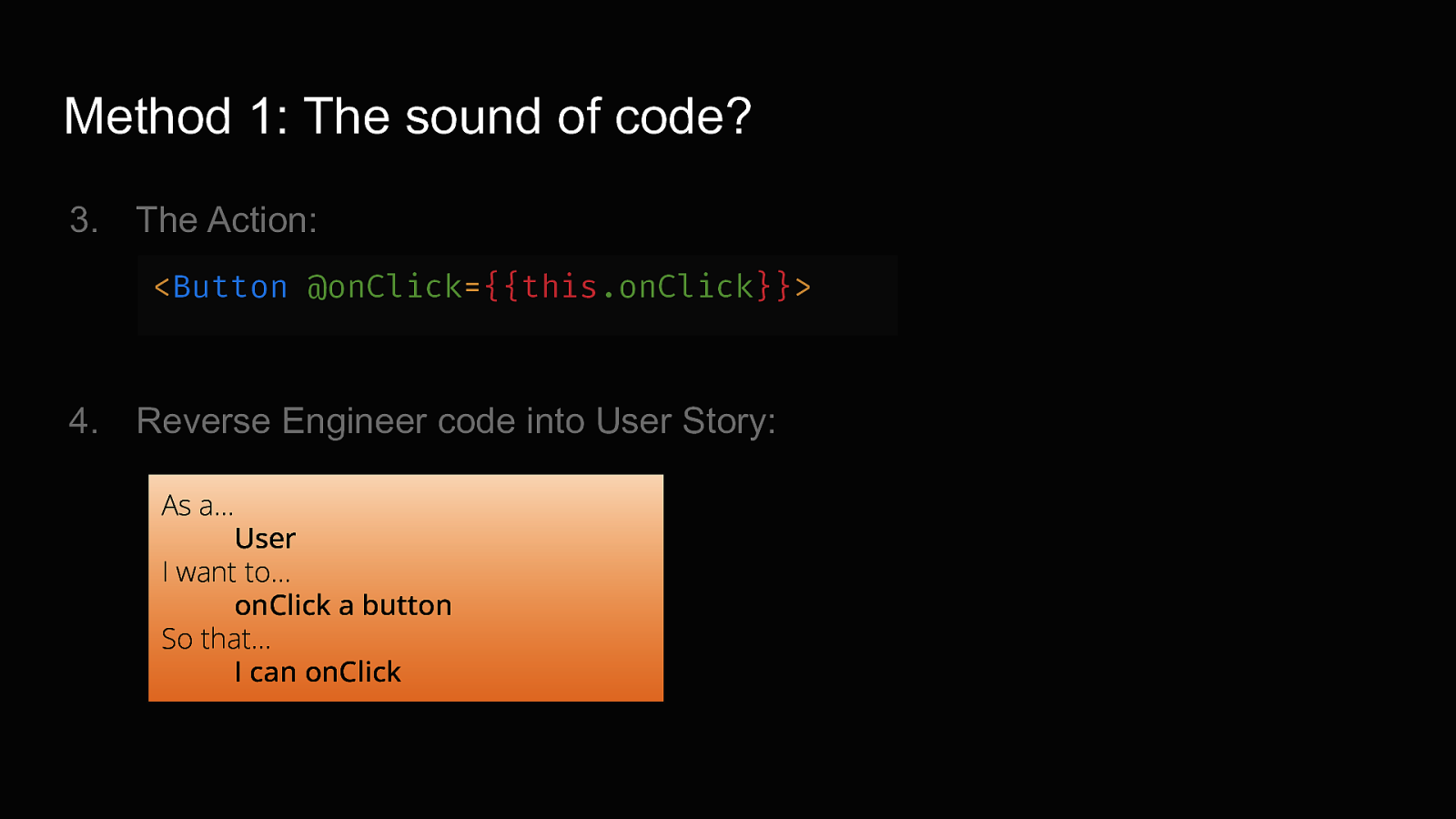
Method 1: The sound of code? 3. The Action: <Button @onClick={{this.onClick}}> 4. Reverse Engineer code into User Story: As a… User I want to… onClick a button So that… I can onClick
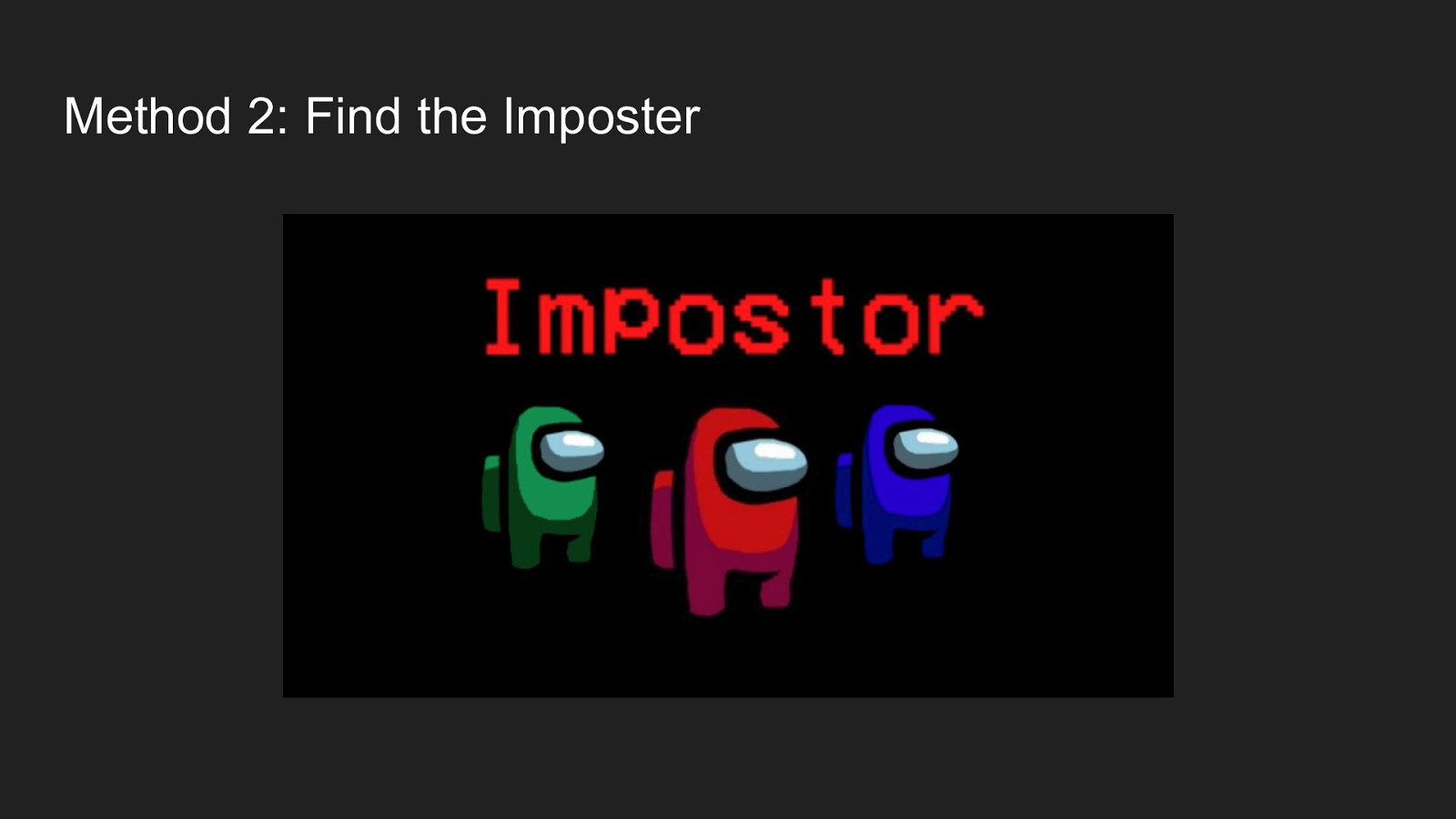
Method 2: Find the Imposter
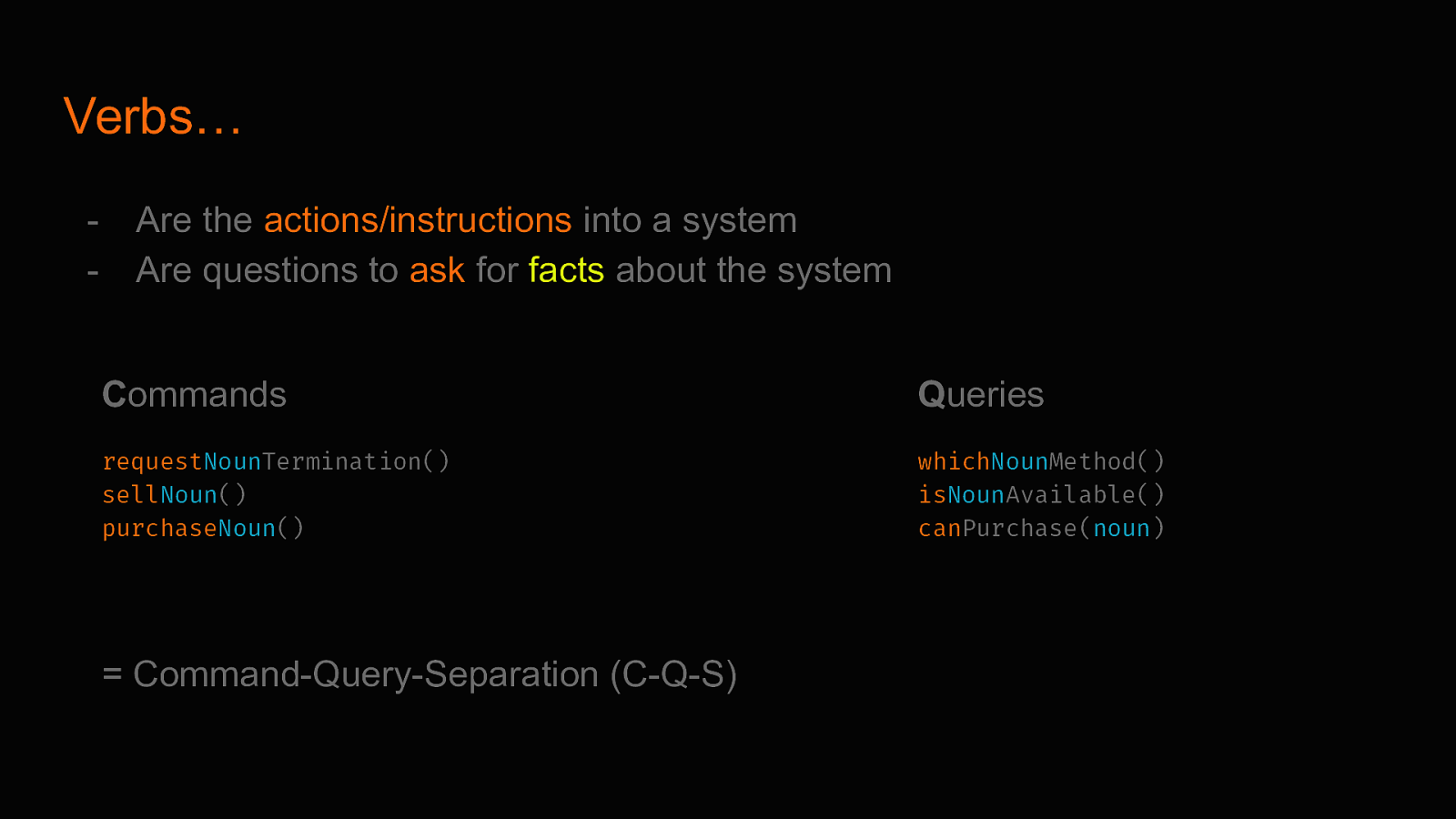
Verbs… - Are the actions/instructions into a system Are questions to ask for facts about the system Commands Queries requestNounTermination() sellNoun() purchaseNoun() whichNounMethod() isNounAvailable() canPurchase(noun) = Command-Query-Separation (C-Q-S)

Method 2: Find the Imposter
interface ThingArgs { thing: { isOn: boolean;
● ●
Are your actions … commanding? Are your questions…. asked?
onClick: () => void; // will set isOn to true }; } export class ThingComponent extends Component<ThingArgs> {
Thing onClick isOn
@action
✅ ❌ ❌
onClick(): void { this.args.thing.onClick(); } static template = hbs<Icon @icon={{this.thing.isOn}} /> <Button @onClick={{this.onClick}}> on </Button>; }
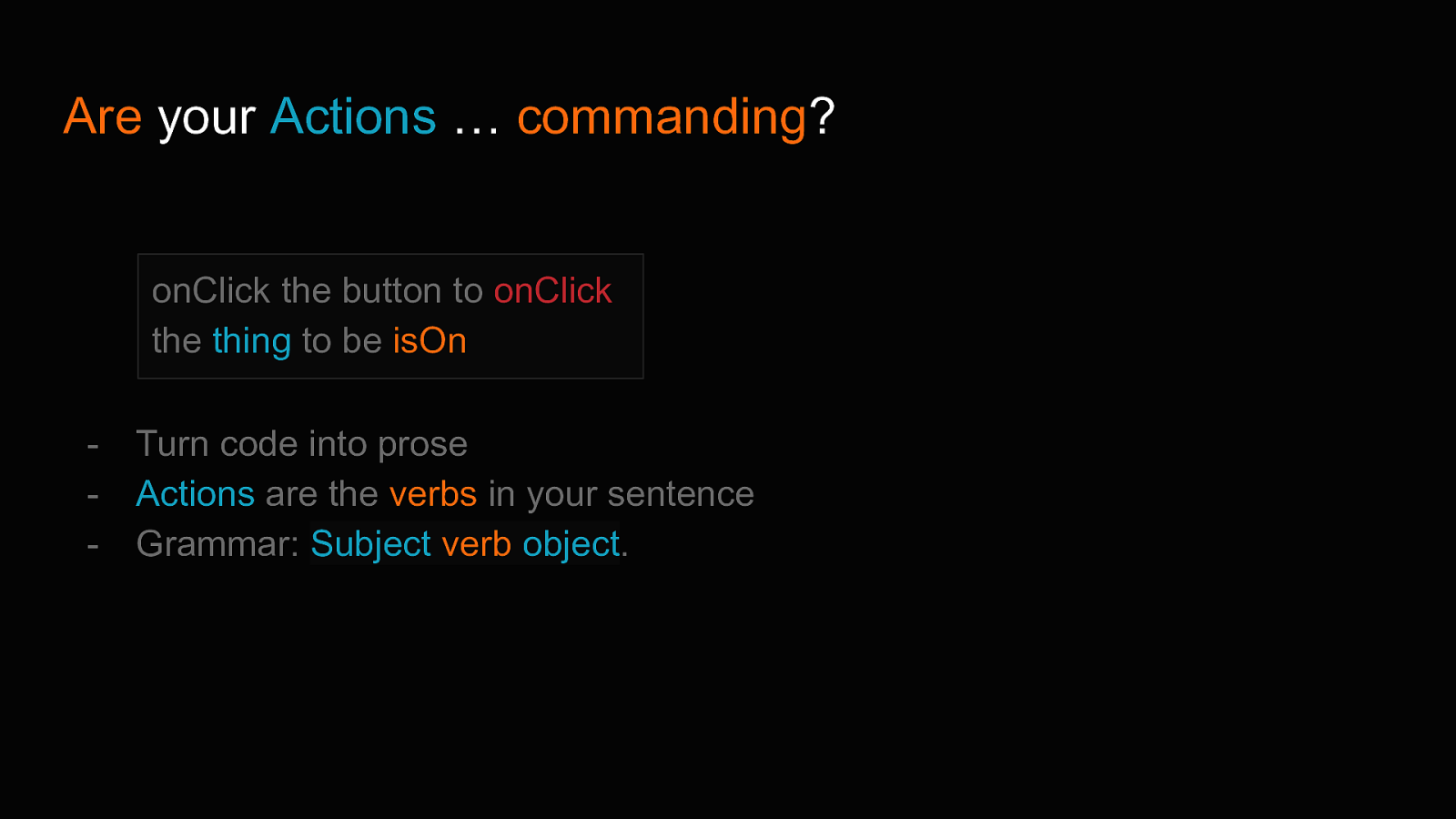
Are your Actions … commanding? onClick the button to onClick the thing to be isOn - Turn code into prose Actions are the verbs in your sentence Grammar: Subject verb object.
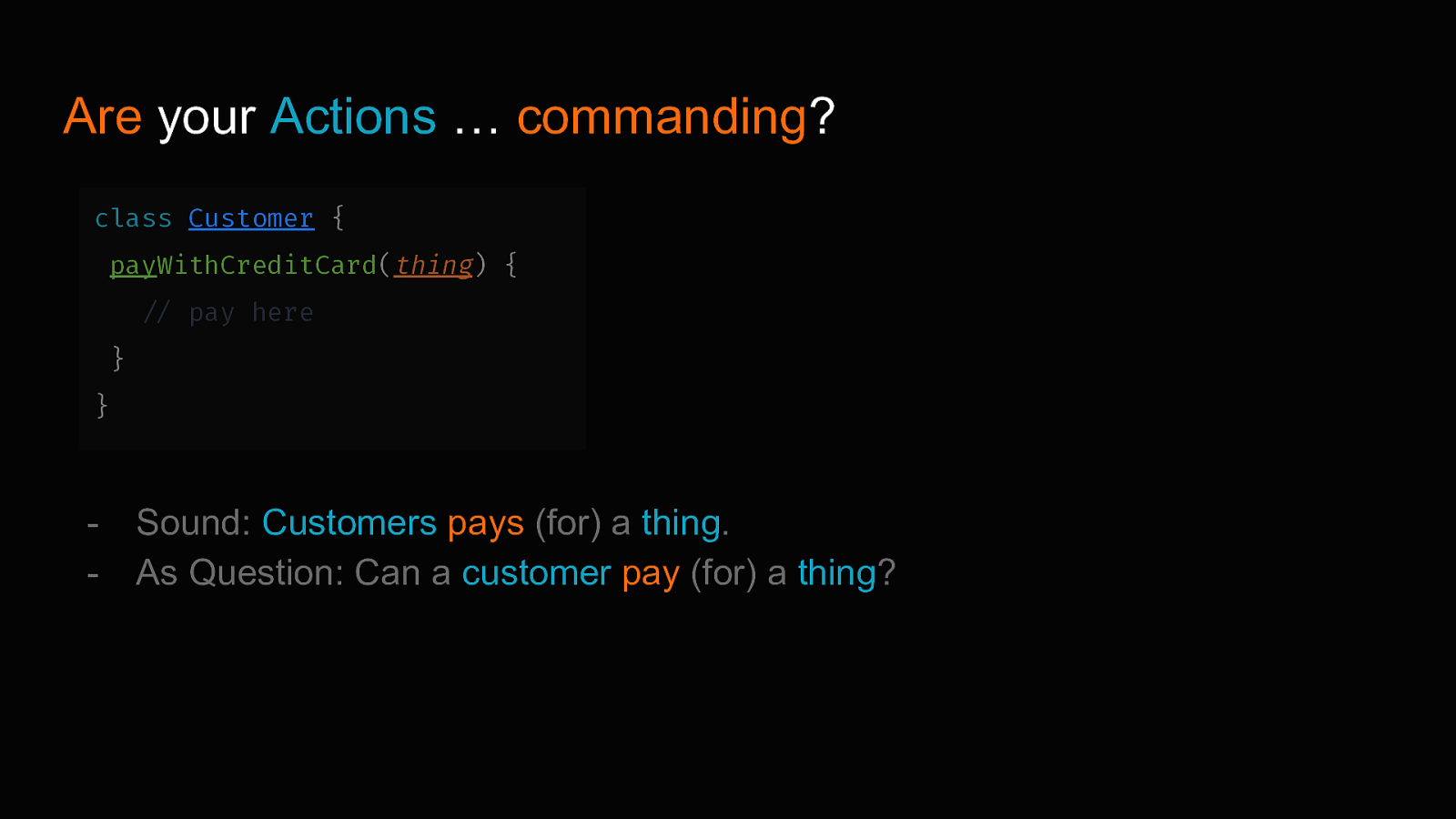
Sound: Customers pays (for) a thing. As Question: Can a customer pay (for) a thing?
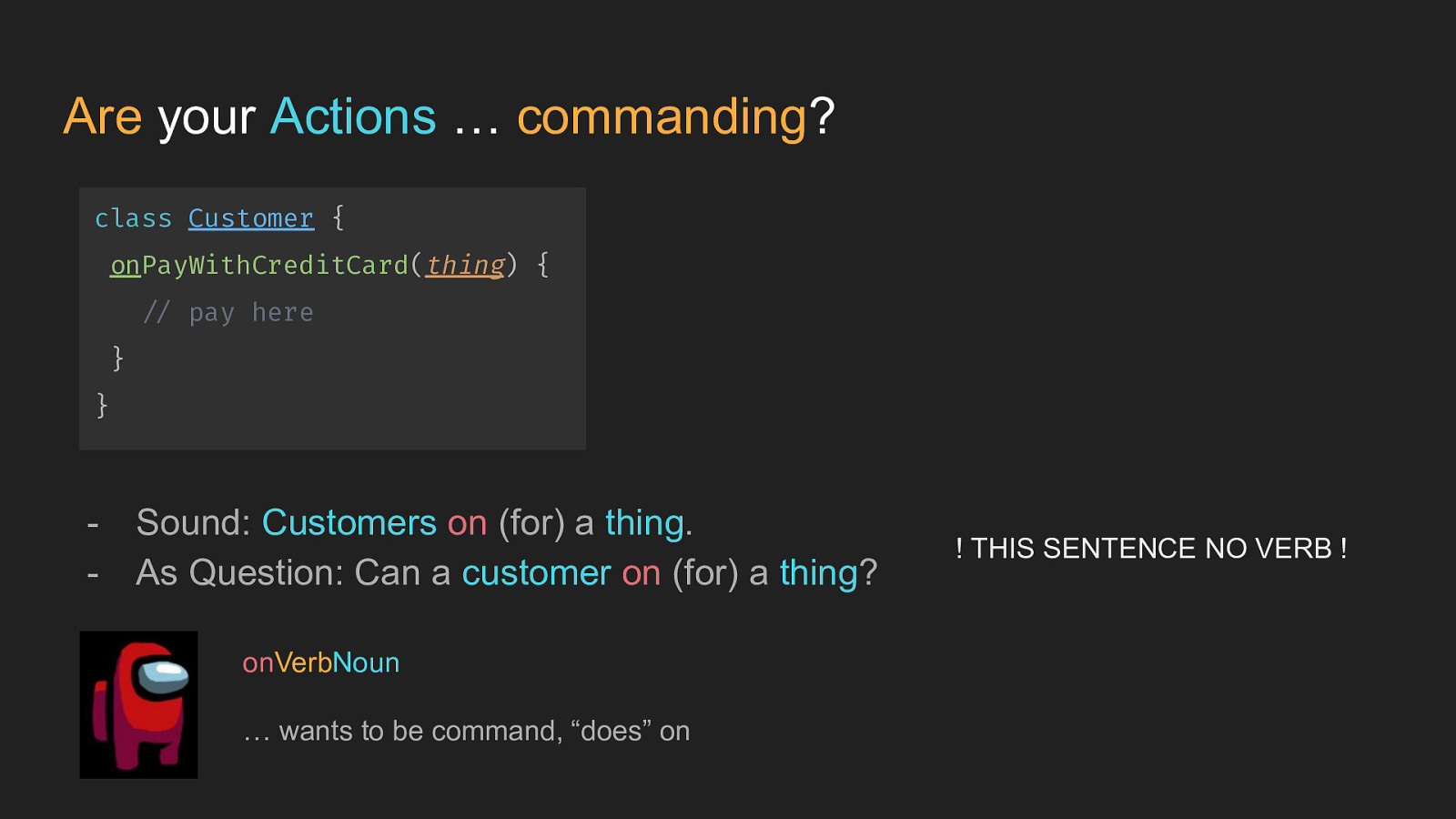
Sound: Customers on (for) a thing. As Question: Can a customer on (for) a thing? onVerbNoun … wants to be command, “does” on ! THIS SENTENCE NO VERB !
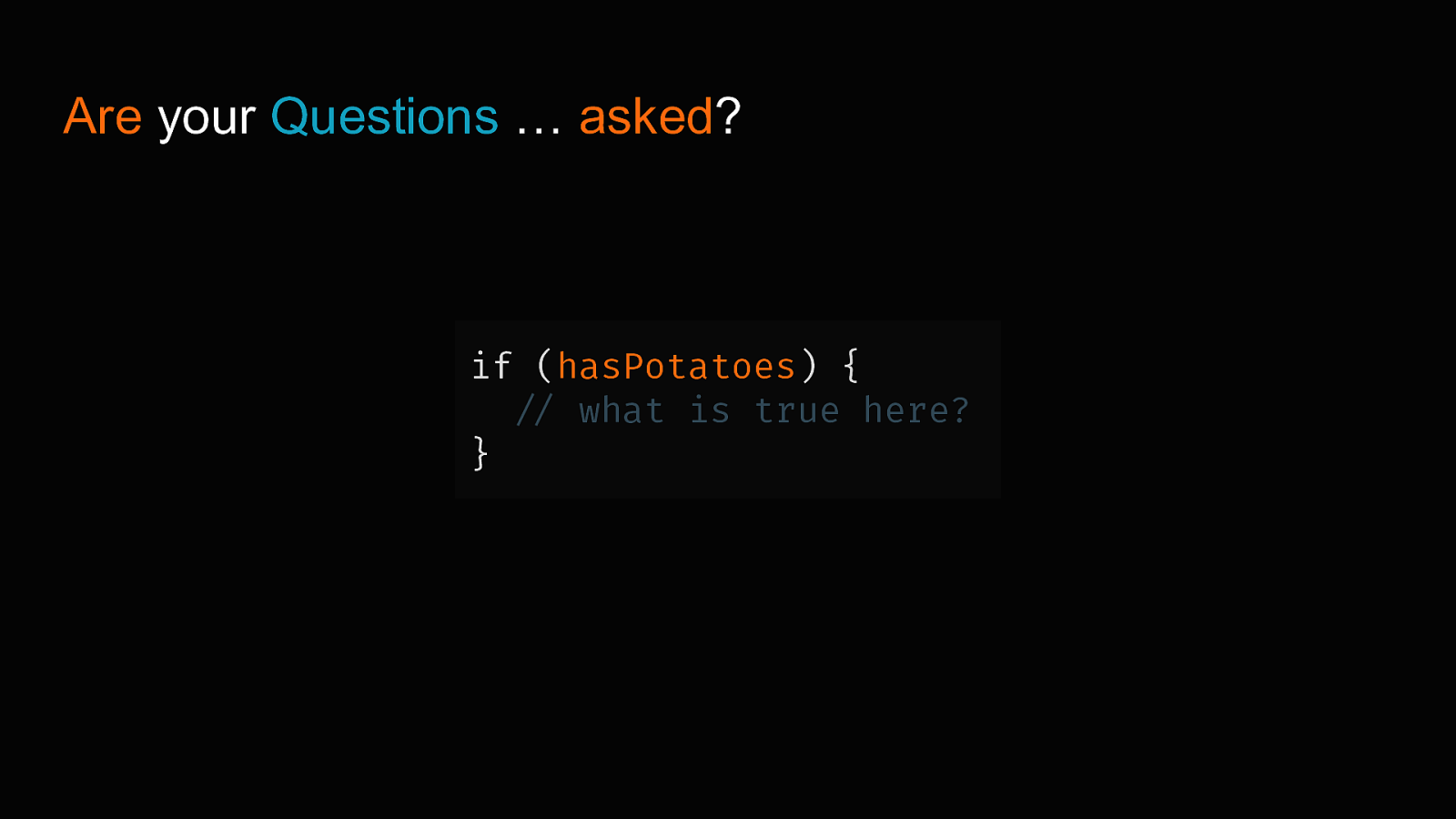
Are your Questions … asked? if (hasPotatoes) { // what is true here? }

“When you go to the supermarket, can you bring 5 eggs and if they have potatoes can you bring 10?” Jack. 32. A 10eggs developer
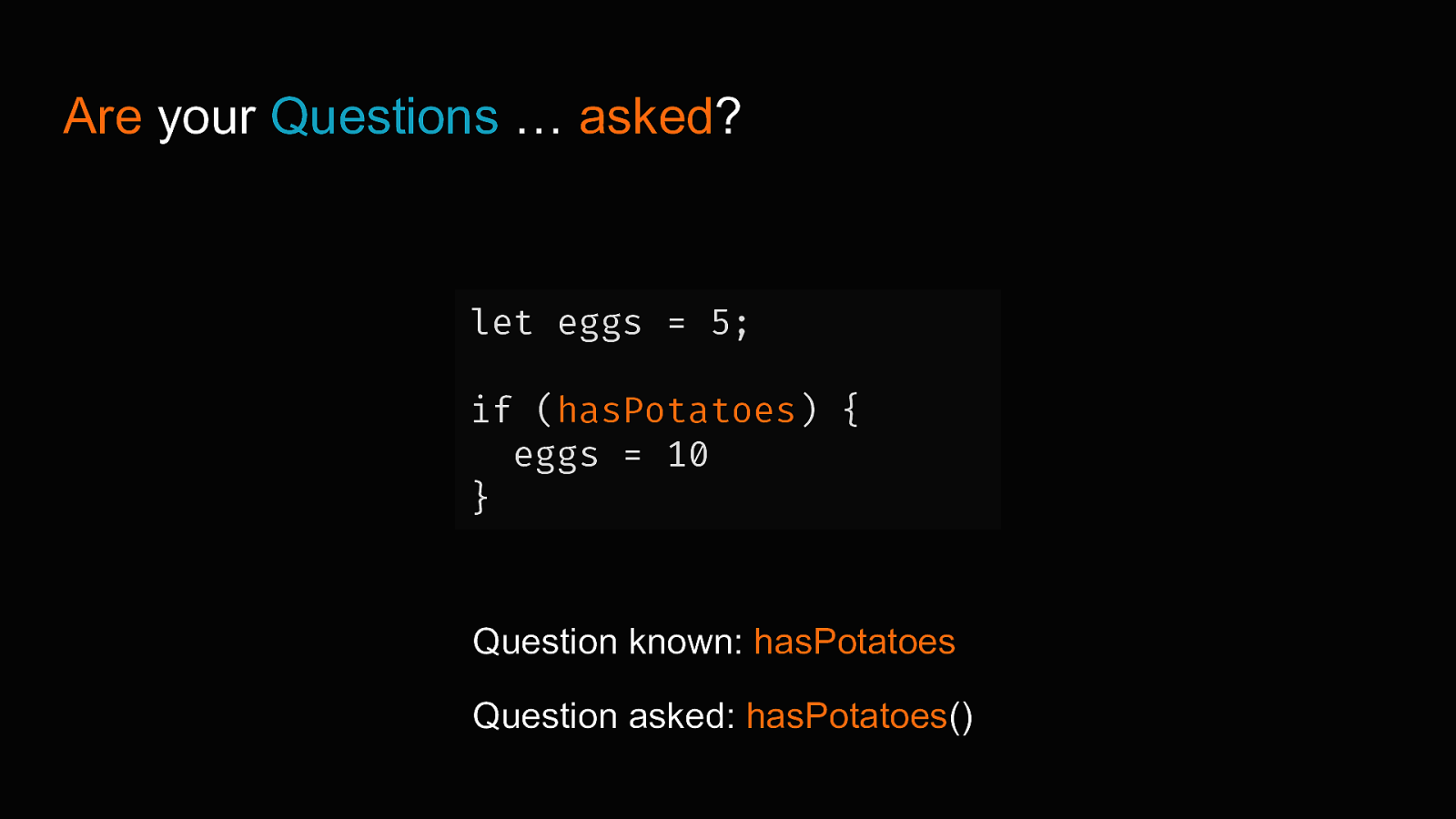
Are your Questions … asked? let eggs = 5; if (hasPotatoes) { eggs = 10 } Question known: hasPotatoes Question asked: hasPotatoes()
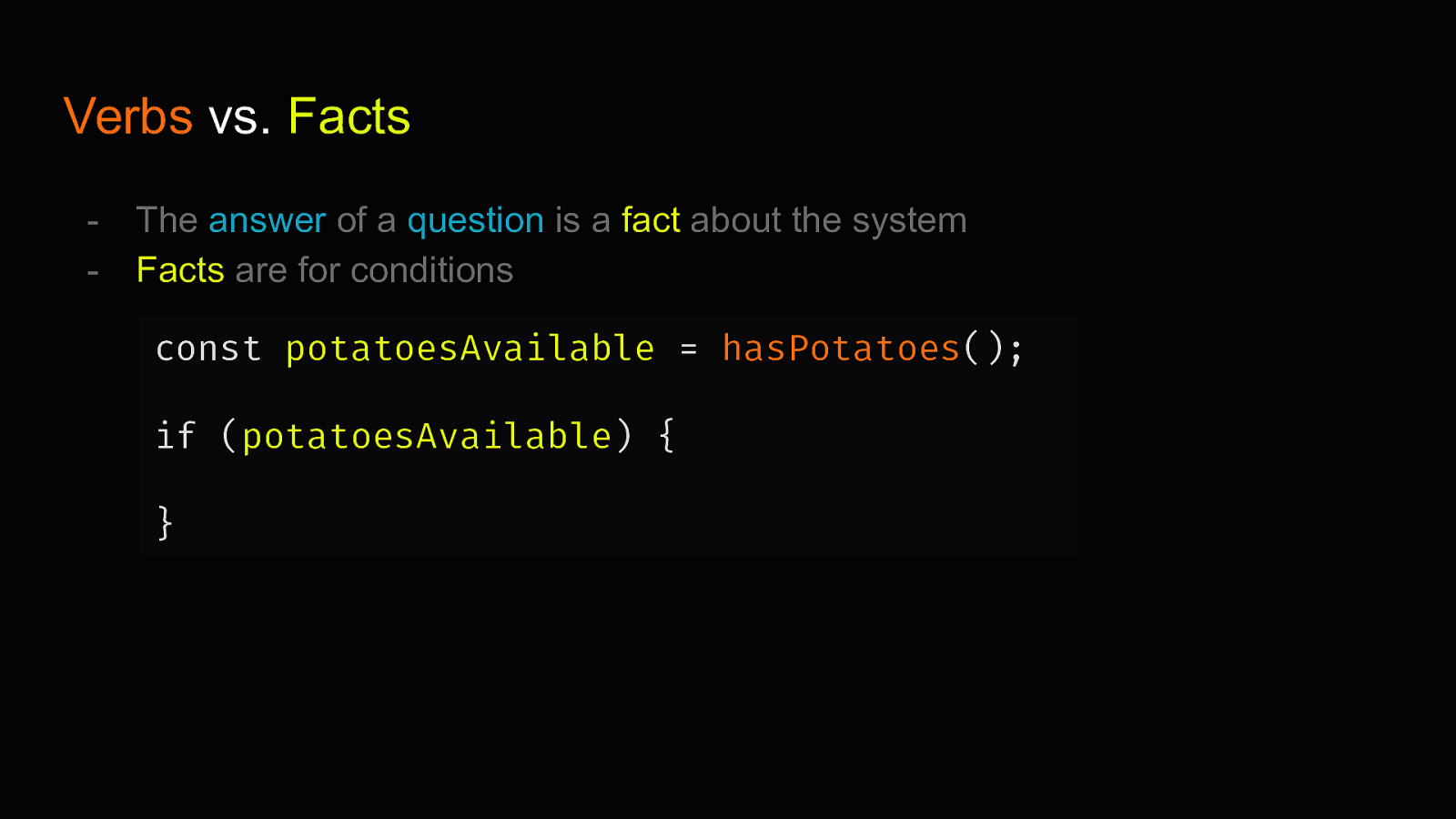
Verbs vs. Facts - The answer of a question is a fact about the system Facts are for conditions const potatoesAvailable = hasPotatoes(); if (potatoesAvailable) { }
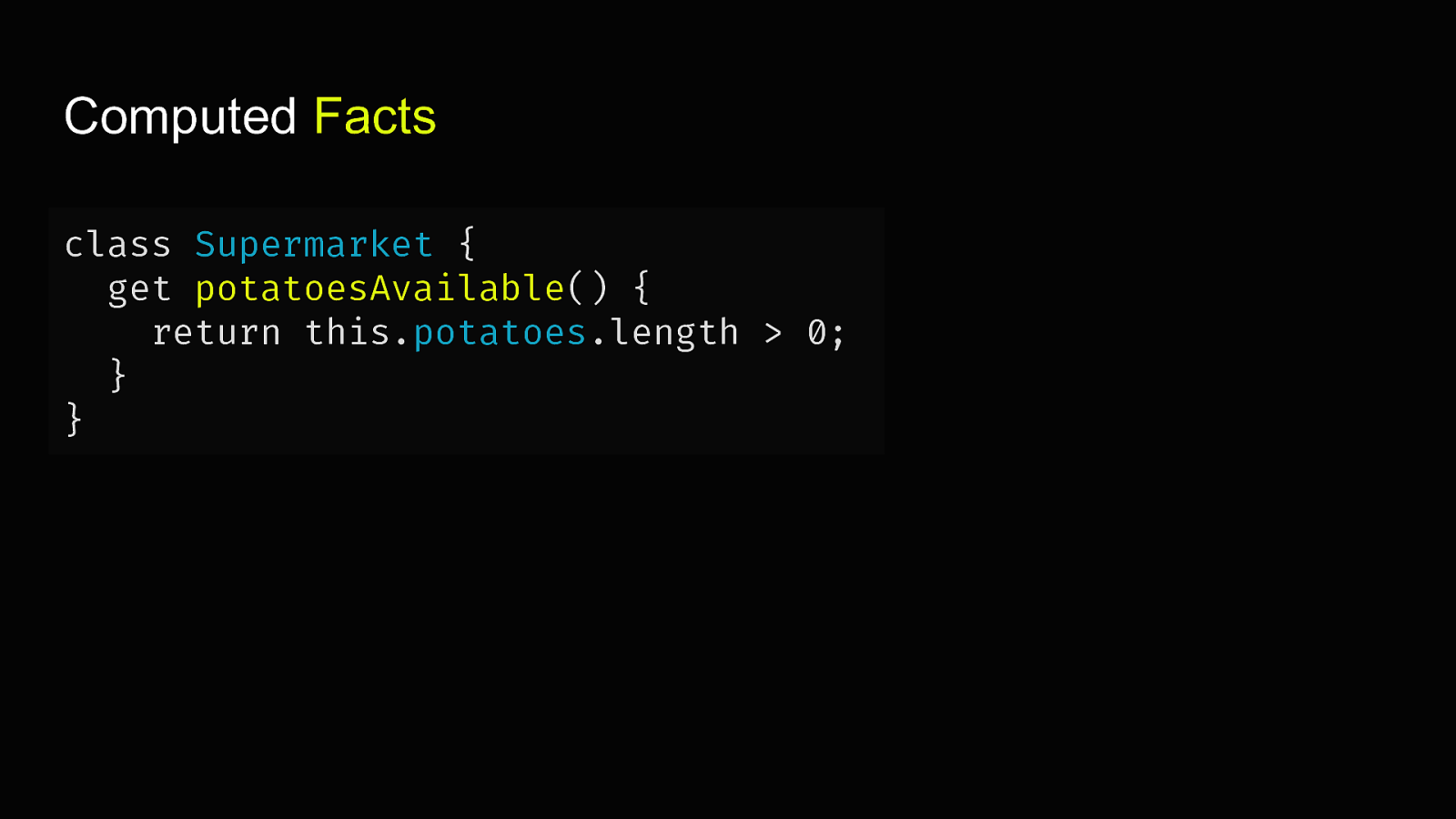
Computed Facts class Supermarket { get potatoesAvailable() { return this.potatoes.length > 0; } }
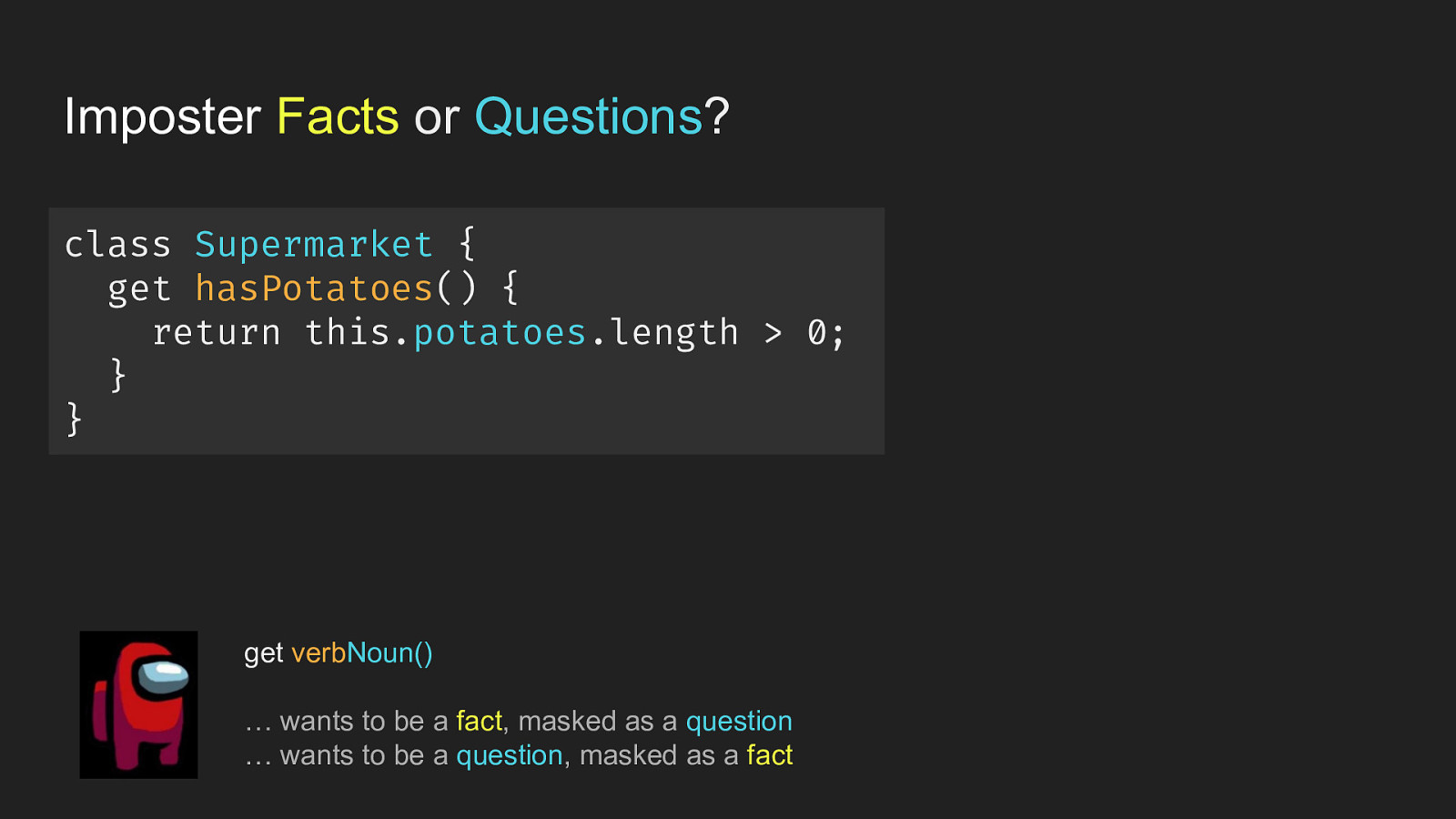
Imposter Facts or Questions? class Supermarket { get hasPotatoes() { return this.potatoes.length > 0; } } get verbNoun() … wants to be a fact, masked as a question … wants to be a question, masked as a fact
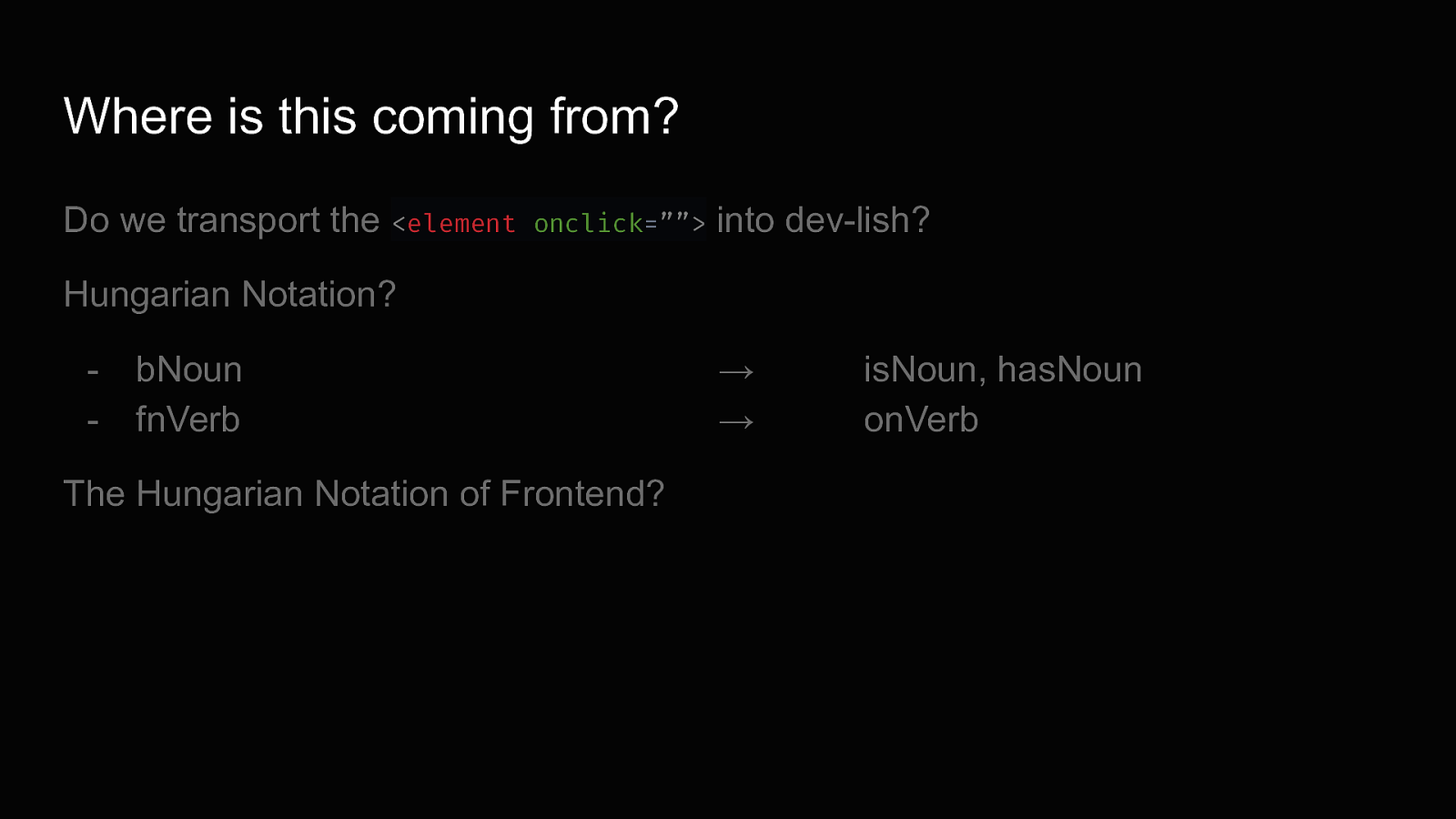
Where is this coming from? Do we transport the <element onclick=””> into dev-lish? Hungarian Notation? - bNoun fnVerb The Hungarian Notation of Frontend? → → isNoun, hasNoun onVerb
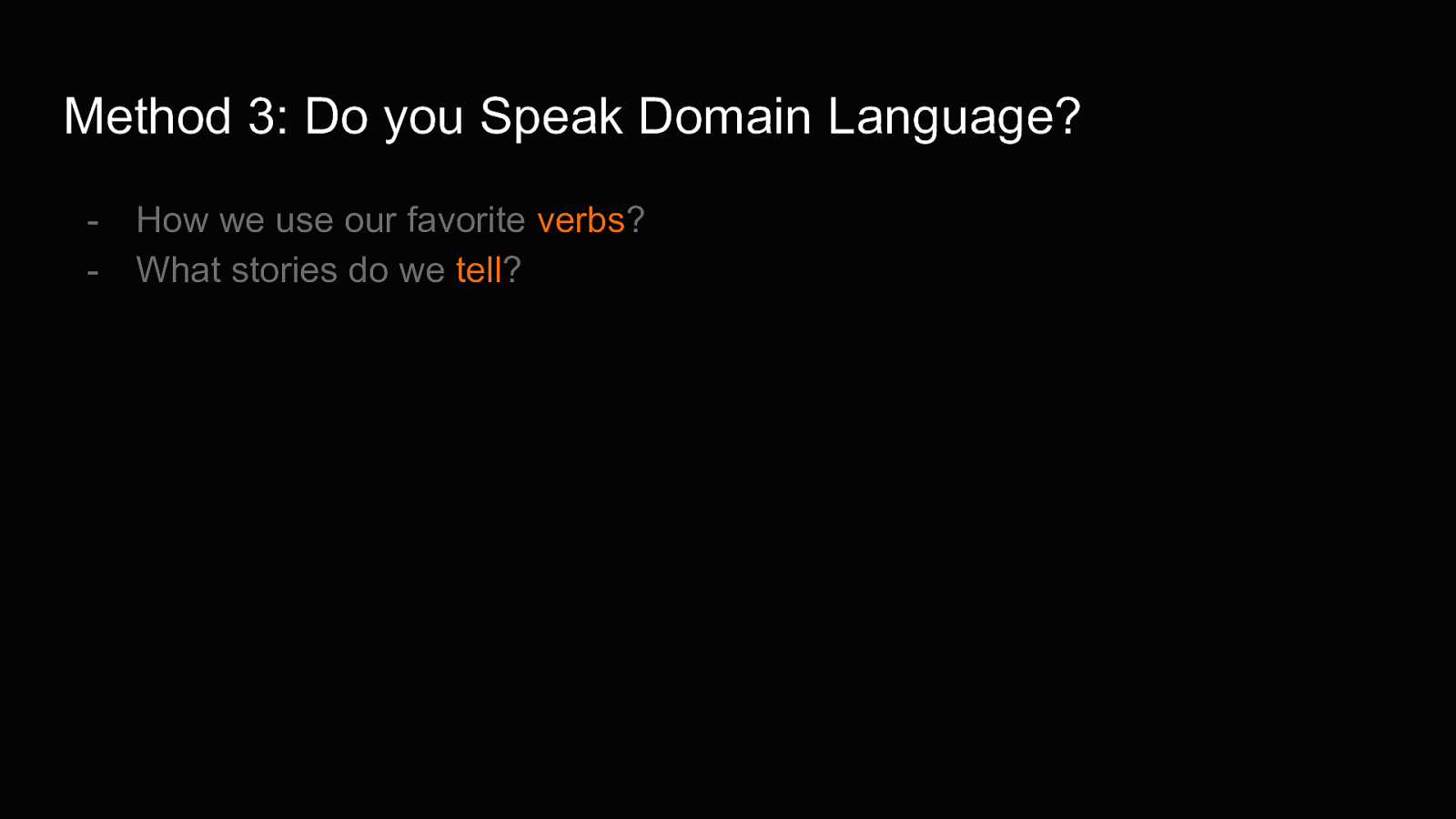
Method 3: Do you Speak Domain Language? - How we use our favorite verbs? What stories do we tell?
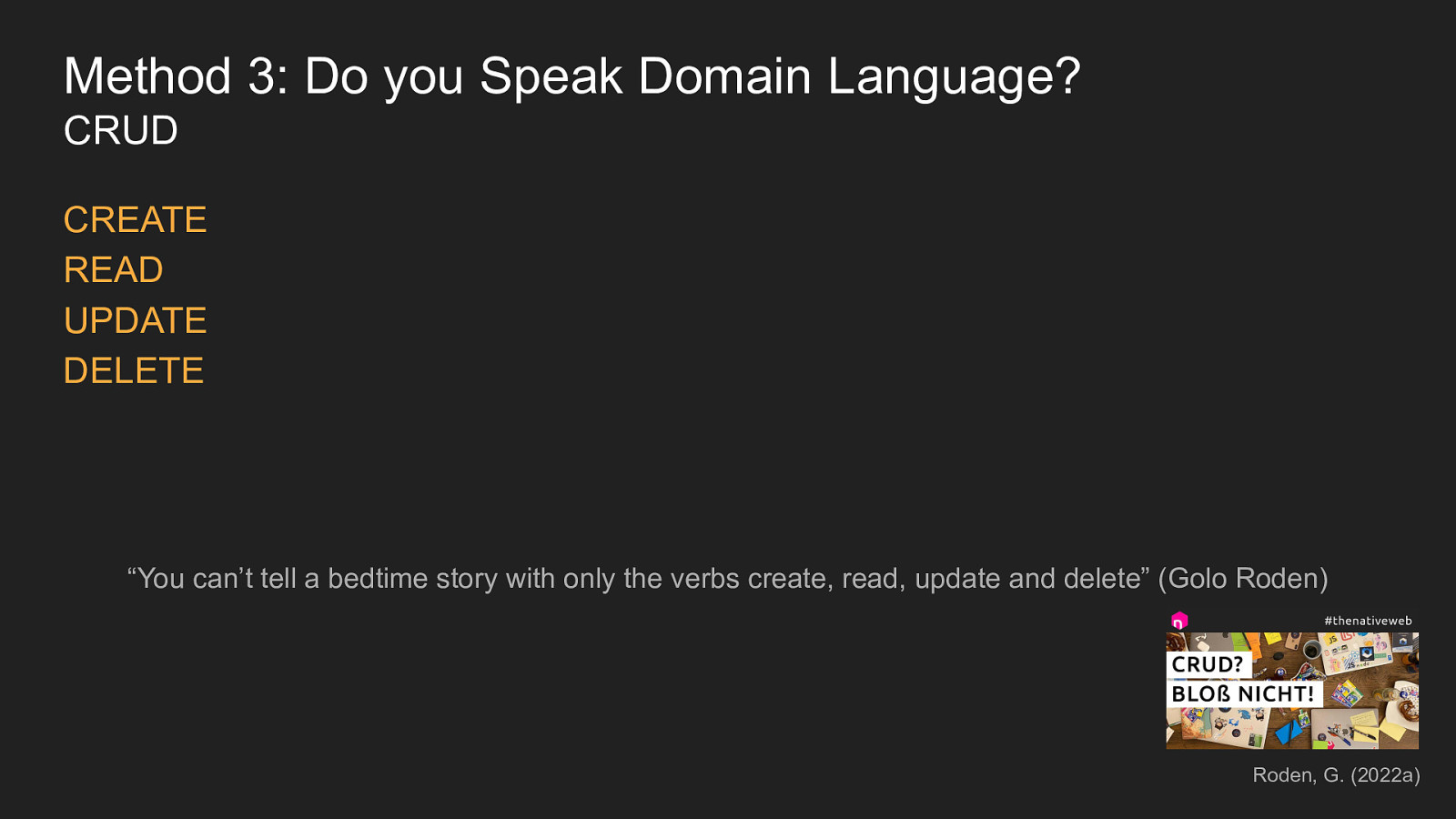
Method 3: Do you Speak Domain Language? CRUD CREATE READ UPDATE DELETE “You can’t tell a bedtime story with only the verbs create, read, update and delete” (Golo Roden) Roden, G. (2022a)
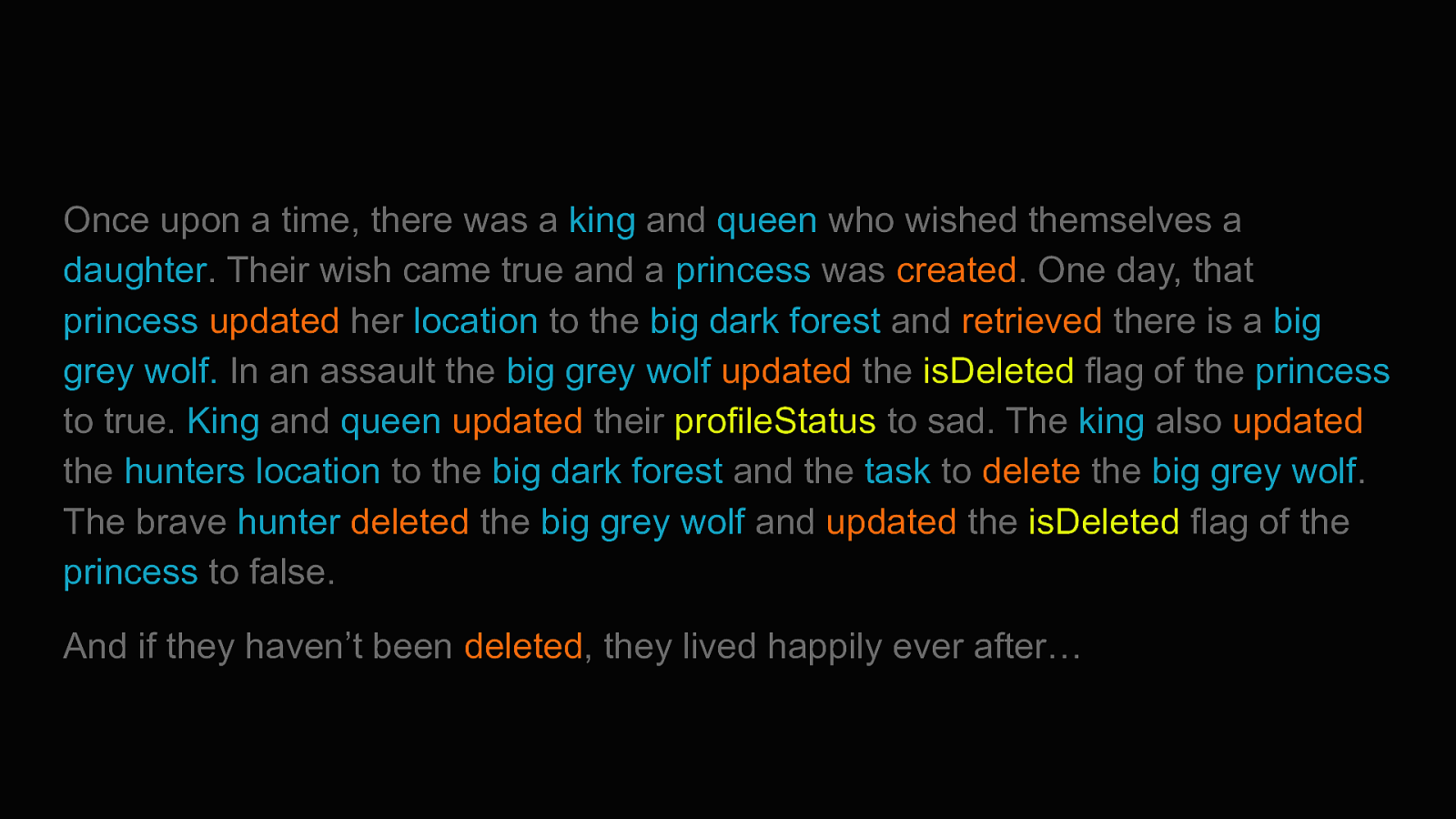
Once upon a time, there was a king and queen who wished themselves a daughter. Their wish came true and a princess was created. One day, that princess updated her location to the big dark forest and retrieved there is a big grey wolf. In an assault the big grey wolf updated the isDeleted flag of the princess to true. King and queen updated their profileStatus to sad. The king also updated the hunters location to the big dark forest and the task to delete the big grey wolf. The brave hunter deleted the big grey wolf and updated the isDeleted flag of the princess to false. And if they haven’t been deleted, they lived happily ever after…
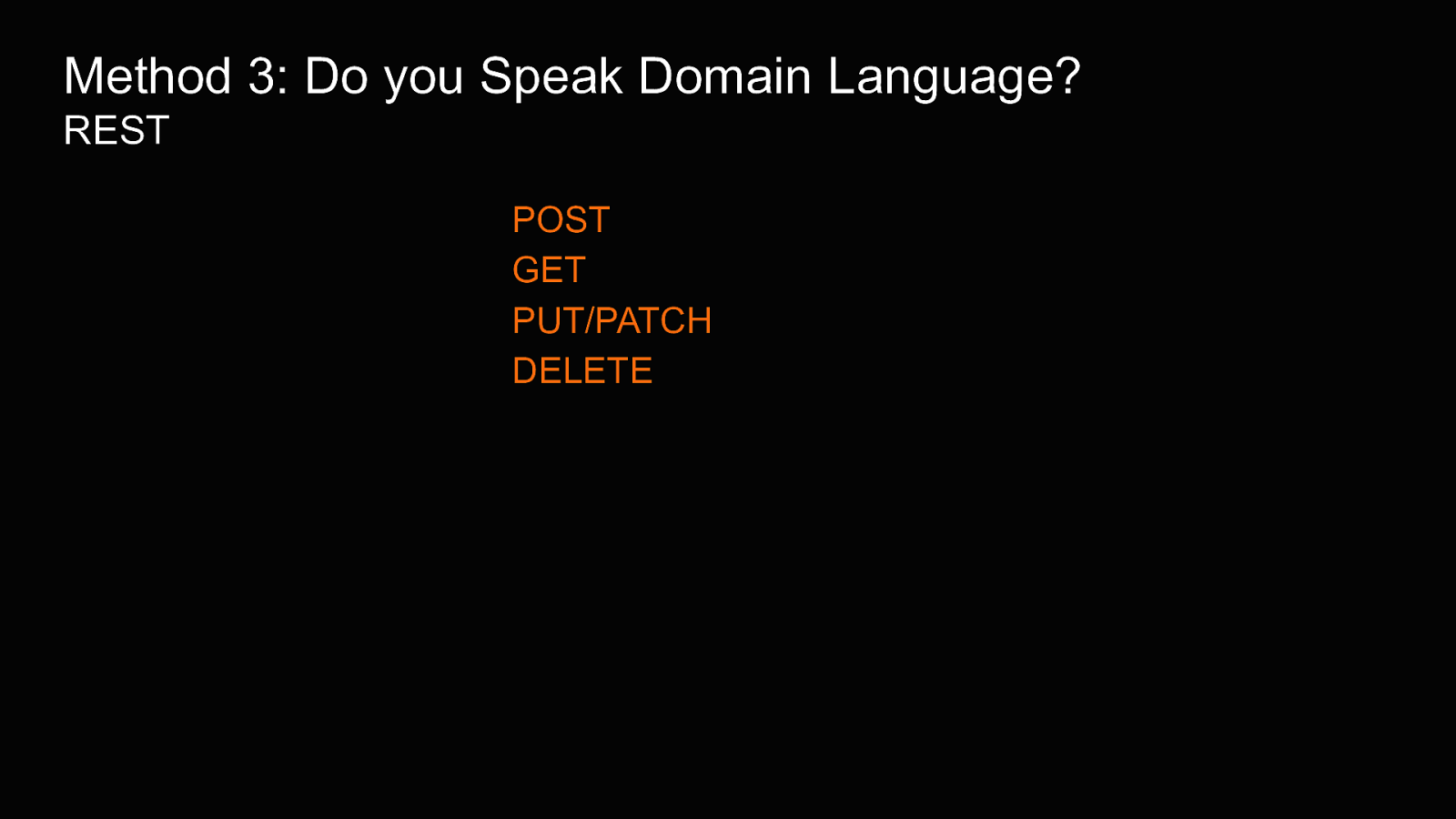
Method 3: Do you Speak Domain Language? REST POST GET PUT/PATCH DELETE
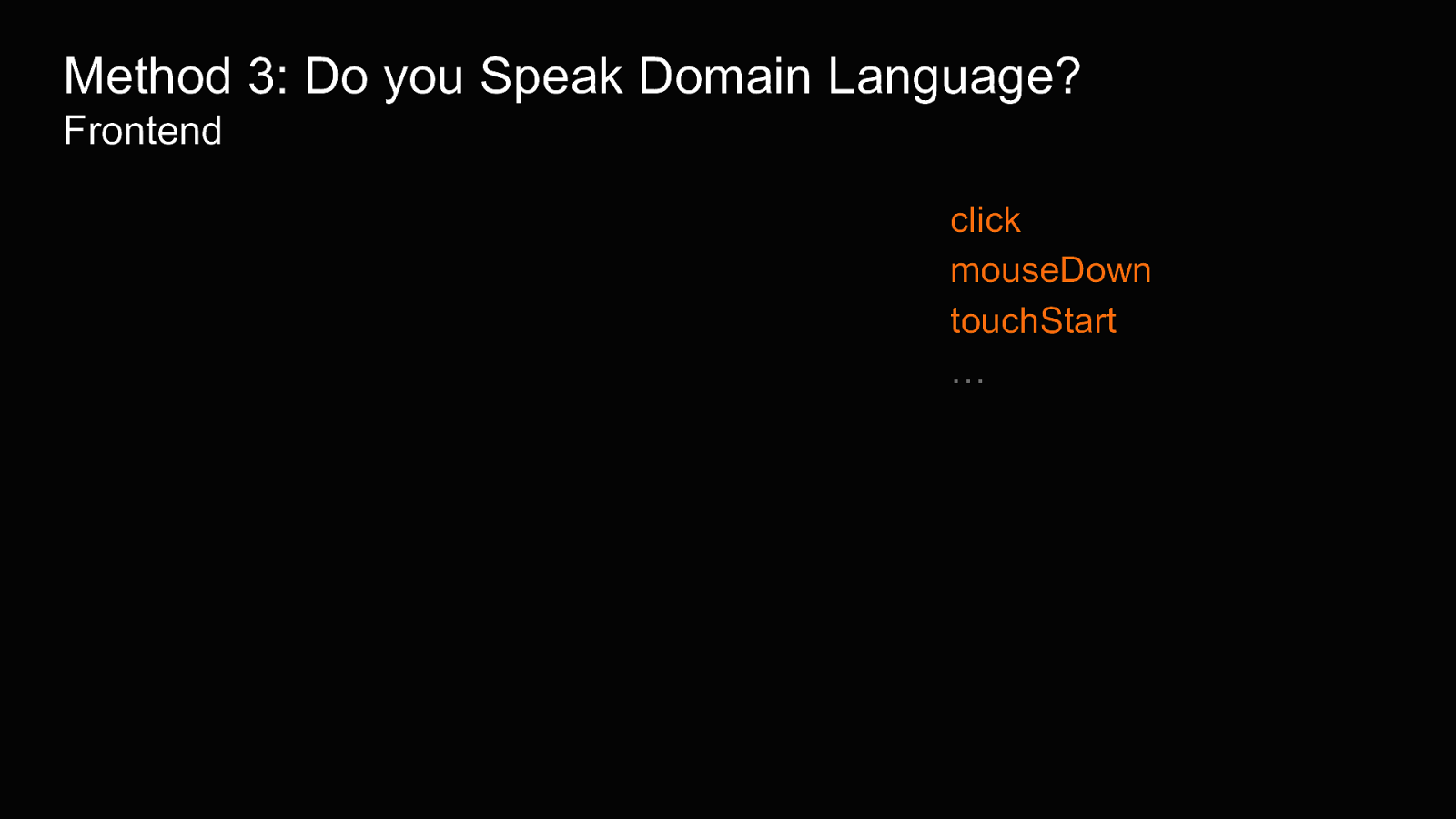
Method 3: Do you Speak Domain Language? Frontend click mouseDown touchStart …
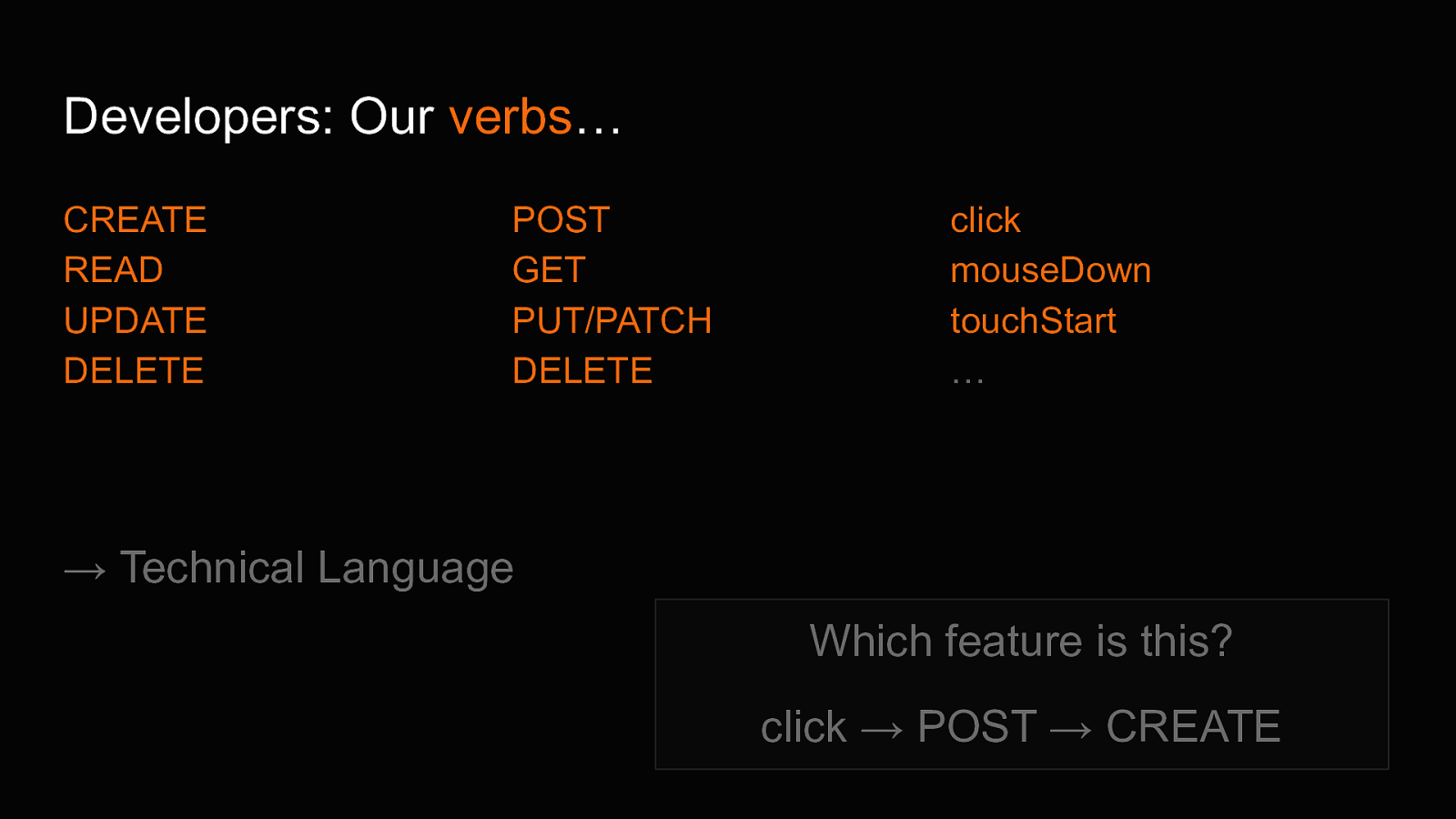
Developers: Our verbs… CREATE READ UPDATE DELETE POST GET PUT/PATCH DELETE click mouseDown touchStart … → Technical Language Which feature is this? click → POST → CREATE
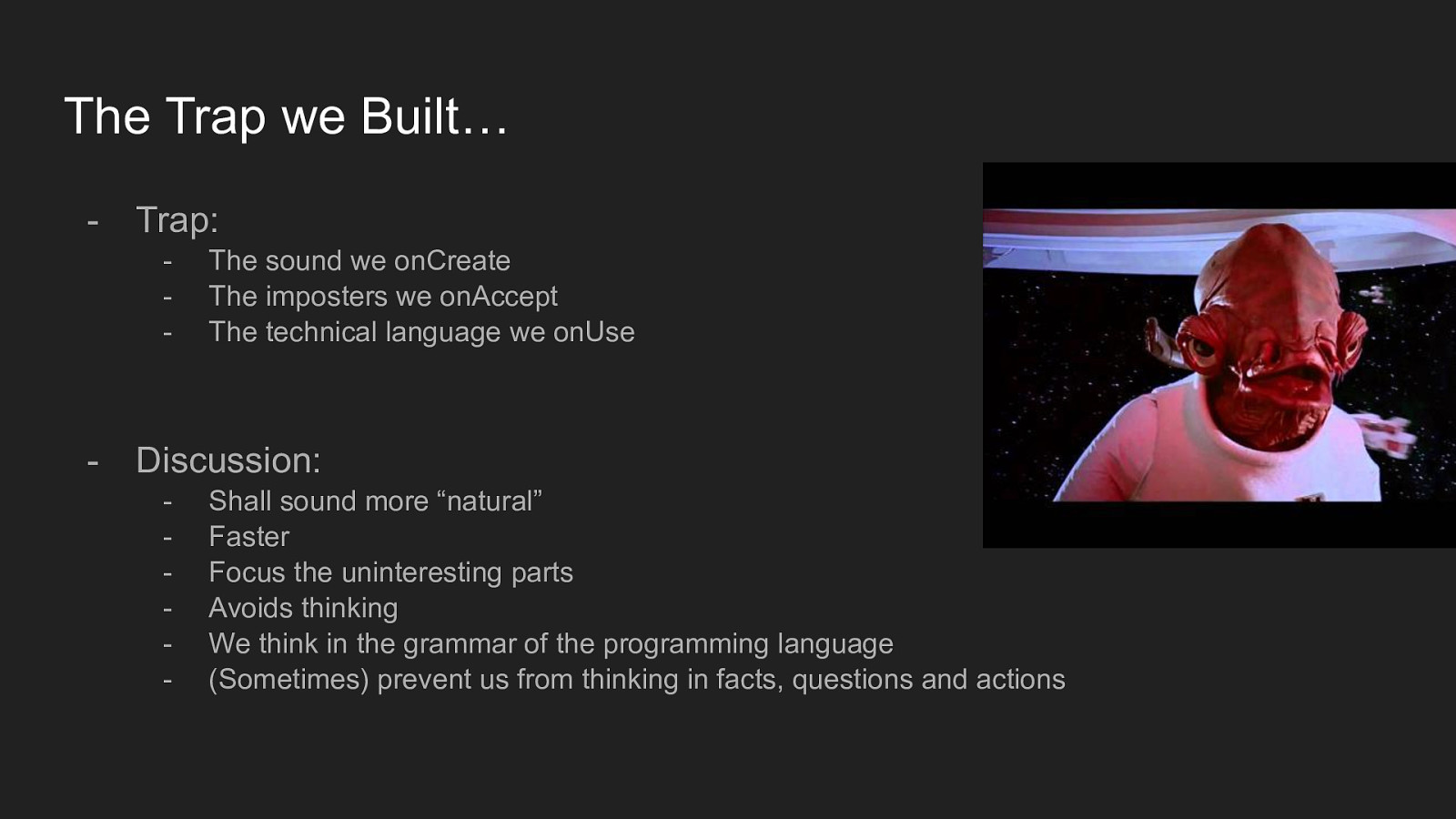
The sound we onCreate The imposters we onAccept The technical language we onUse Discussion: - Shall sound more “natural” Faster Focus the uninteresting parts Avoids thinking We think in the grammar of the programming language (Sometimes) prevent us from thinking in facts, questions and actions

Part III How to communicate clearly :)

Use English Translate from Technical to Domain Language Becoming a Product-Minded Software Engineer
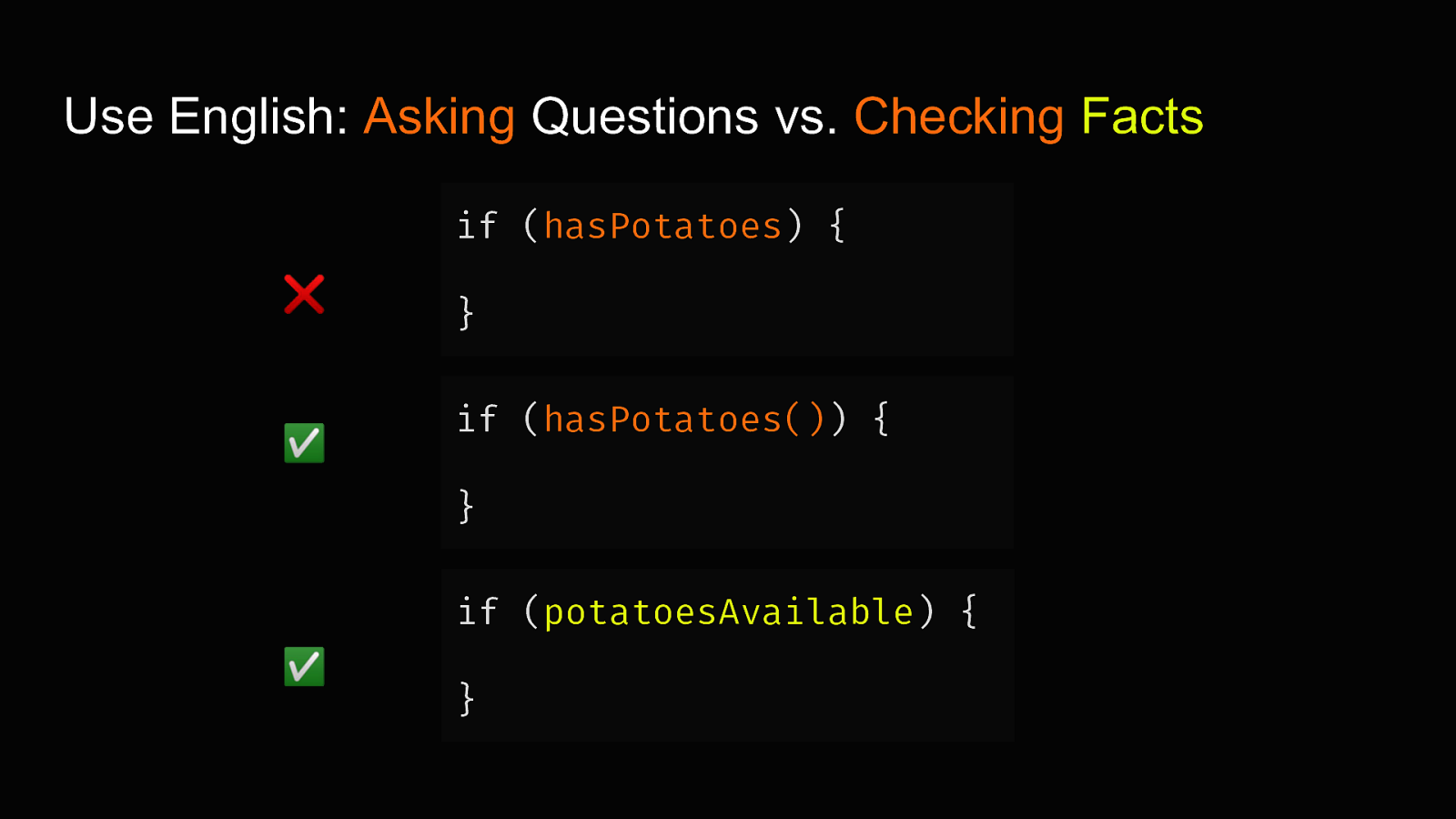
Use English: Asking Questions vs. Checking Facts if (hasPotatoes) { ❌ ✅ } if (hasPotatoes()) { } if (potatoesAvailable) { ✅ }
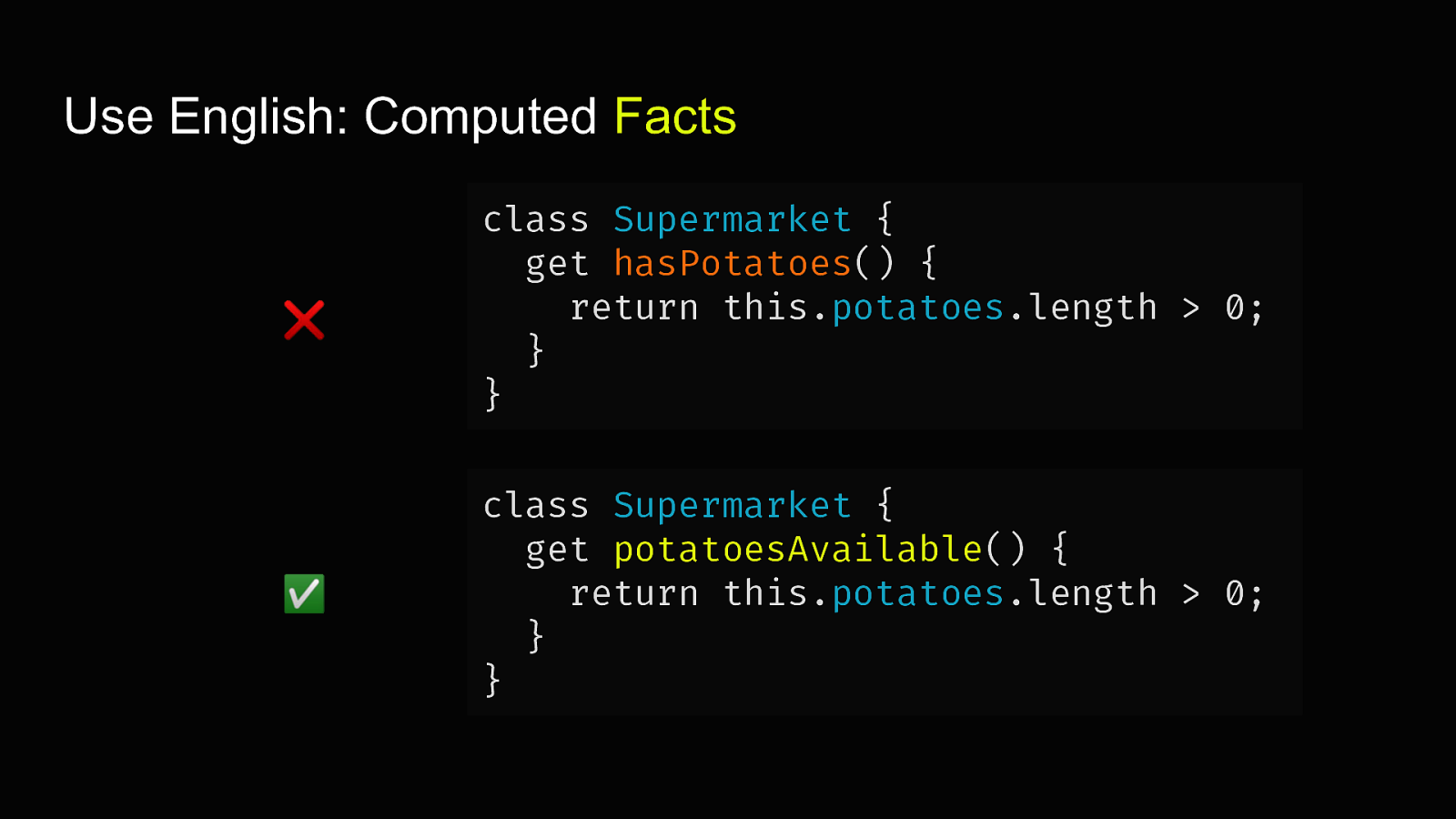
Use English: Computed Facts ❌ class Supermarket { get hasPotatoes() { return this.potatoes.length > 0; } } ✅ class Supermarket { get potatoesAvailable() { return this.potatoes.length > 0; } }
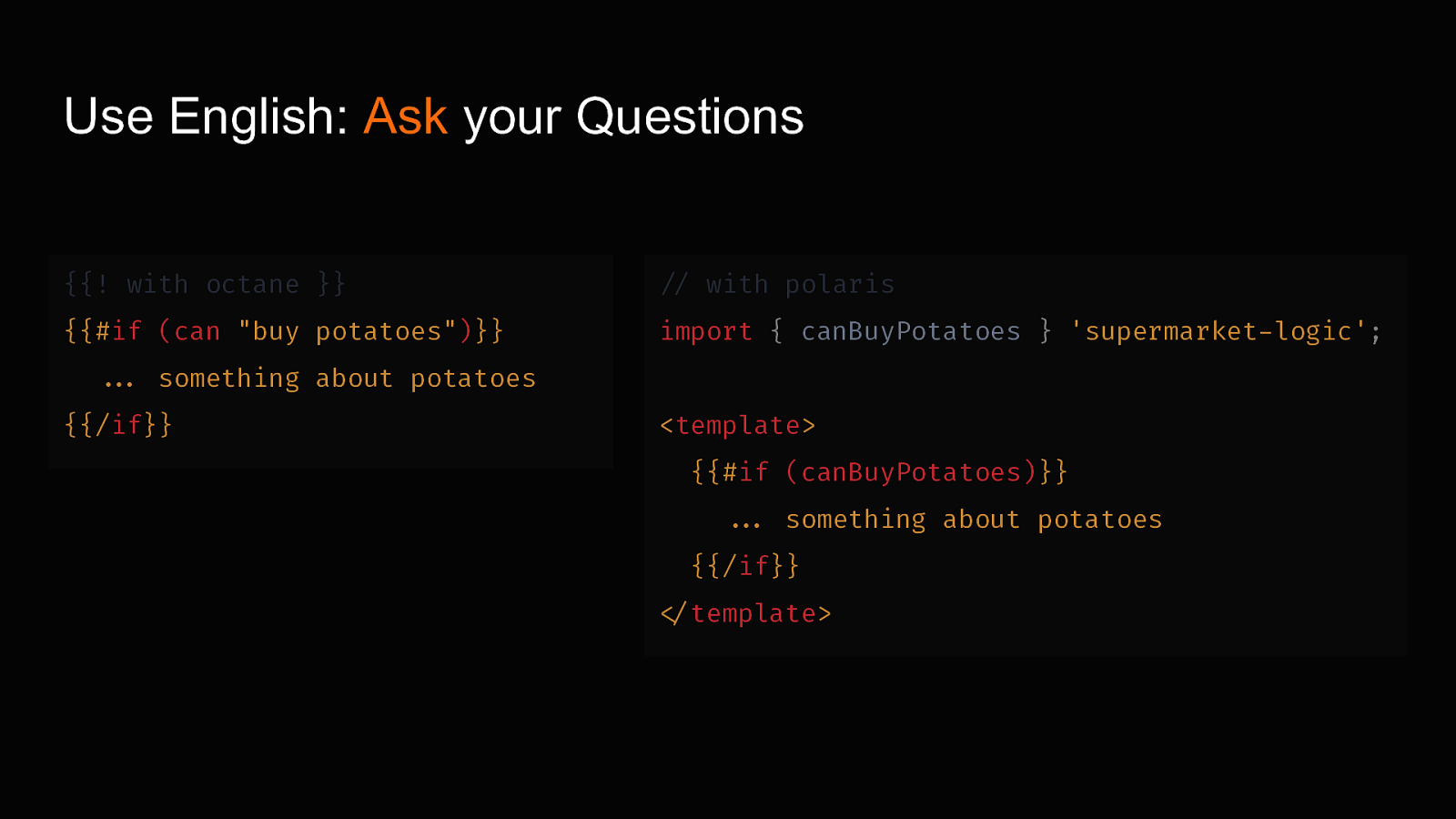
Use English: Ask your Questions {{! with octane }} // with polaris {{#if (can “buy potatoes”)}} import { canBuyPotatoes } ‘supermarket-logic’; … something about potatoes {{/if}} <template> {{#if (canBuyPotatoes)}} … something about potatoes {{/if}} </template>
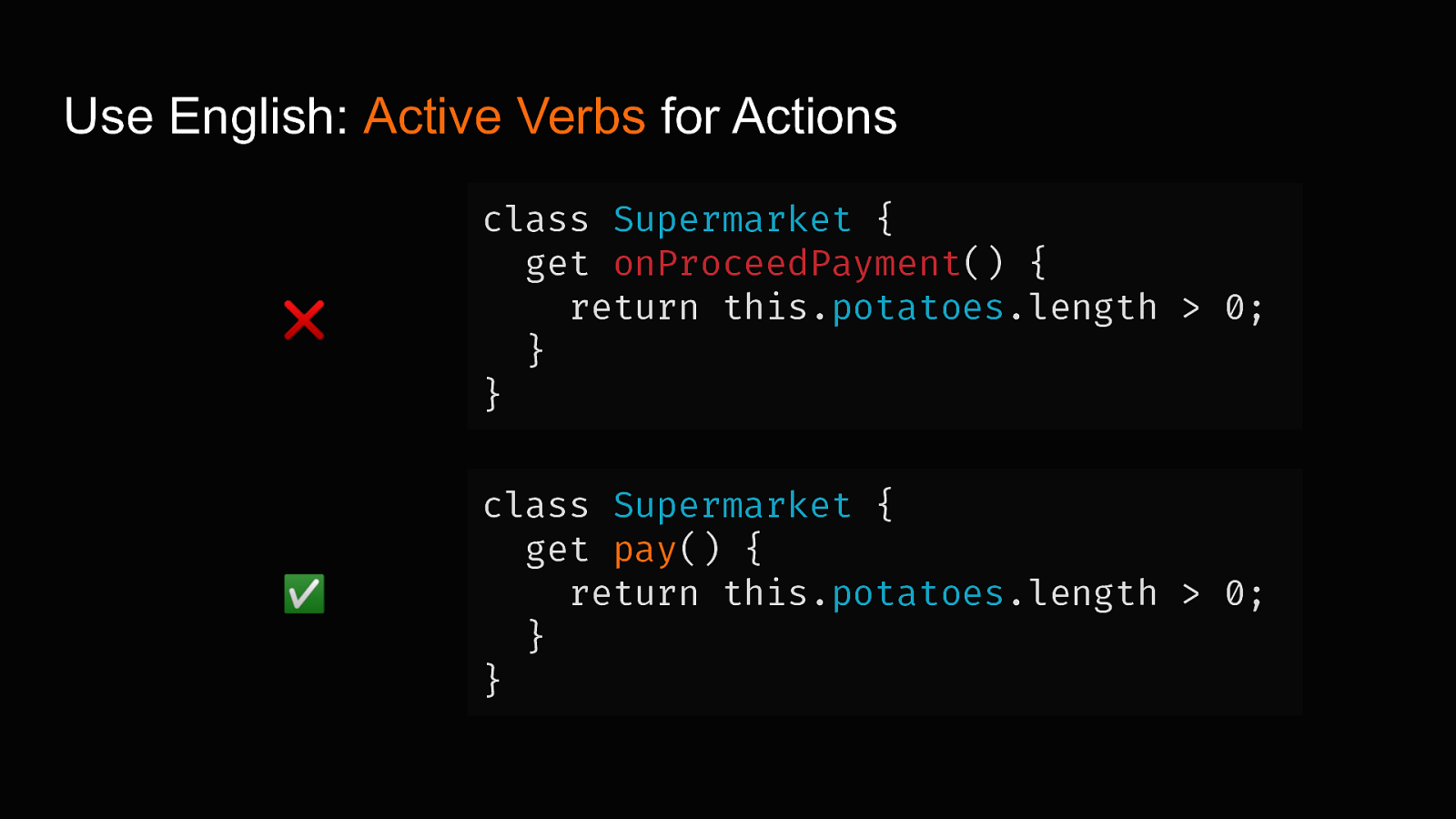
Use English: Active Verbs for Actions ❌ class Supermarket { get onProceedPayment() { return this.potatoes.length > 0; } } ✅ class Supermarket { get pay() { return this.potatoes.length > 0; } }

Translate from Technical to Domain Language CRUD REST DOM Events → Repository → Event Sourcing → only GET and POST → GraphQL → Sockets →? Roden, G. (2022b)
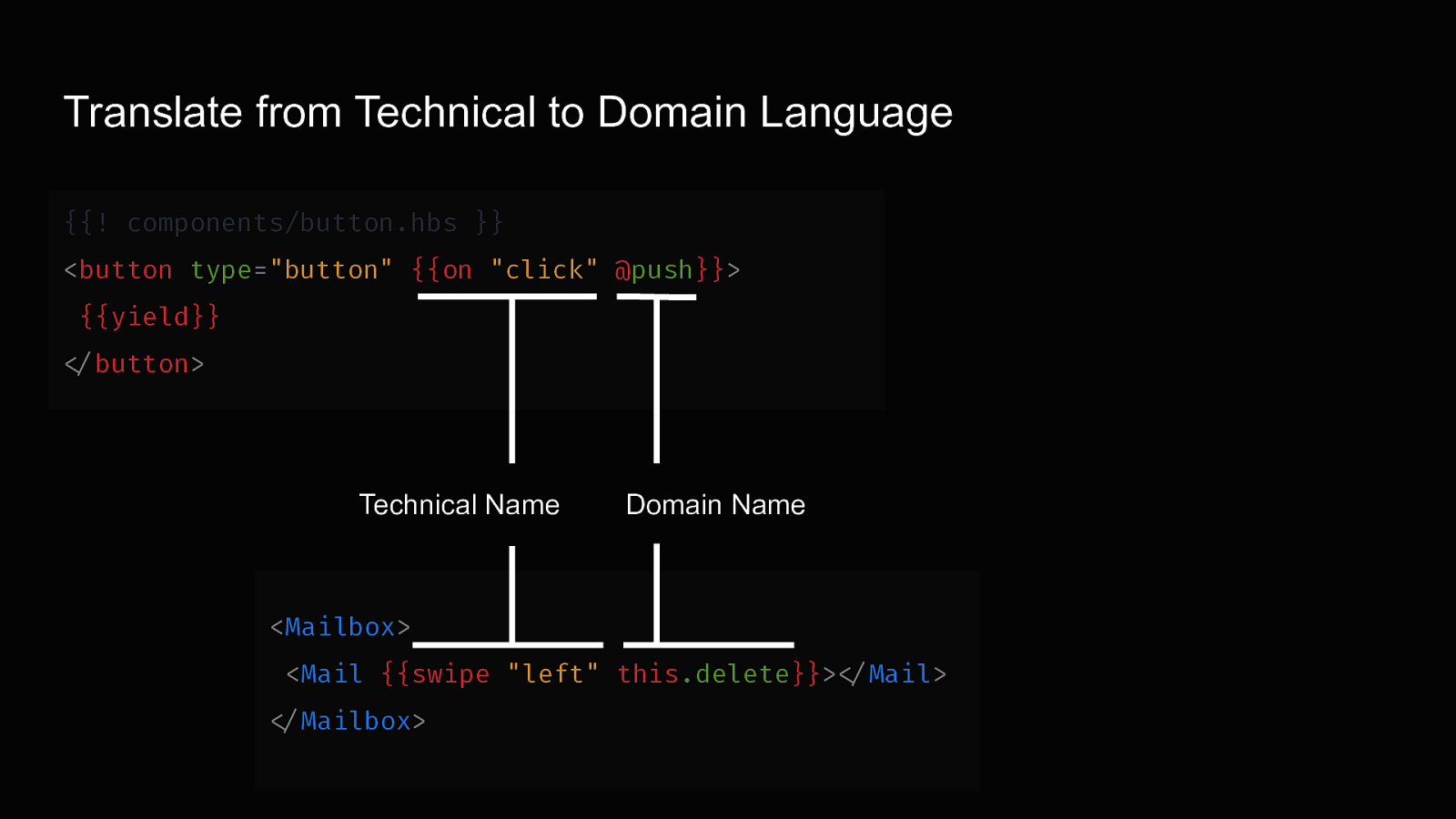
Translate from Technical to Domain Language {{! components/button.hbs }} <button type=”button” {{on “click” @push}}> {{yield}} </button> Technical Name Domain Name <Mailbox> <Mail {{swipe “left” this.delete}}></Mail> </Mailbox>
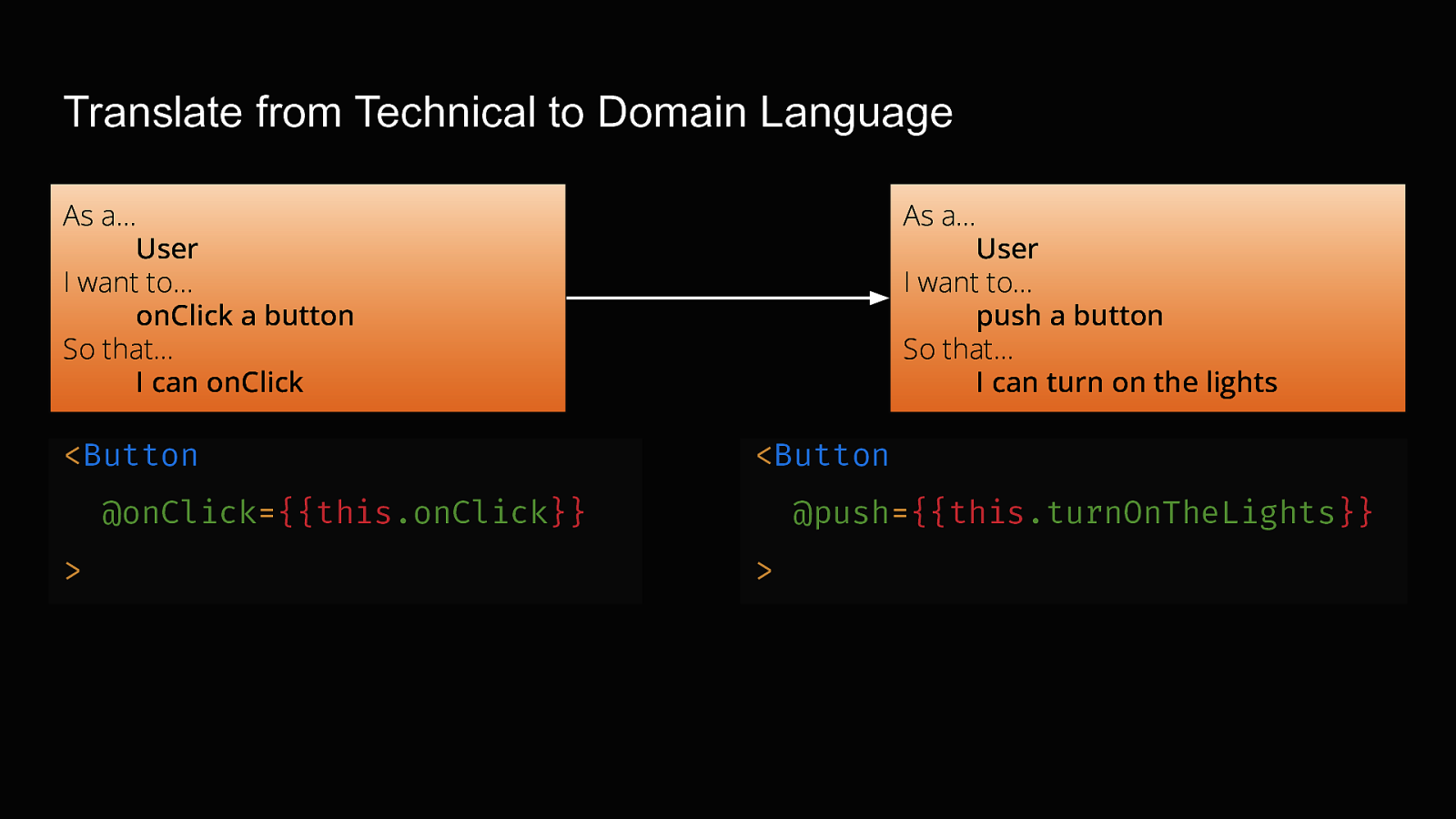
Translate from Technical to Domain Language As a… As a… User I want to… onClick a button So that… I can onClick <Button User I want to… push a button So that… I can turn on the lights <Button @onClick={{this.onClick}} > @push={{this.turnOnTheLights}} >
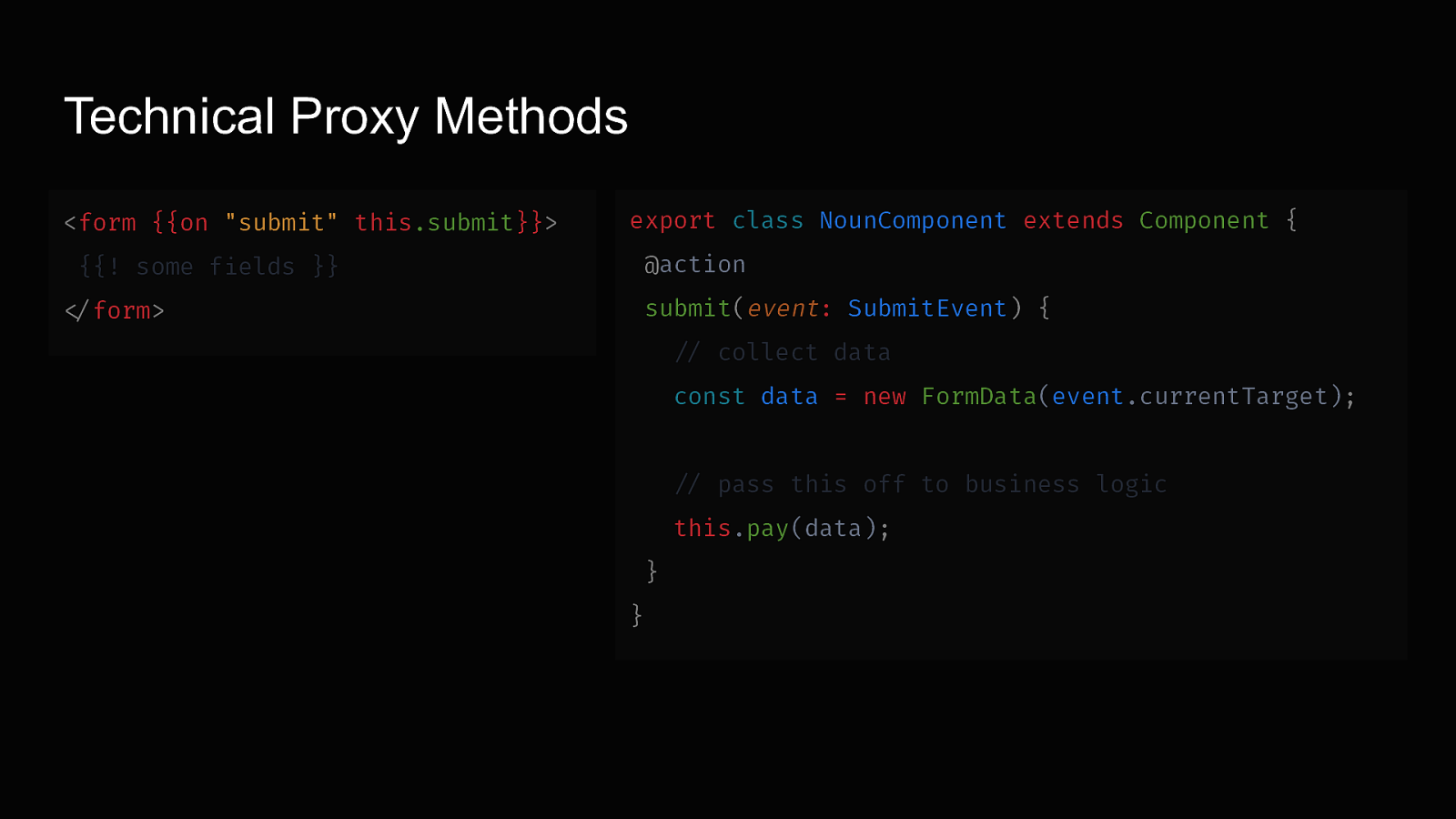
Technical Proxy Methods <form {{on “submit” this.submit}}> export class NounComponent extends Component { @action {{! some fields }} </form> submit(event: SubmitEvent) { // collect data const data = new FormData(event.currentTarget); // pass this off to business logic this.pay(data); } }
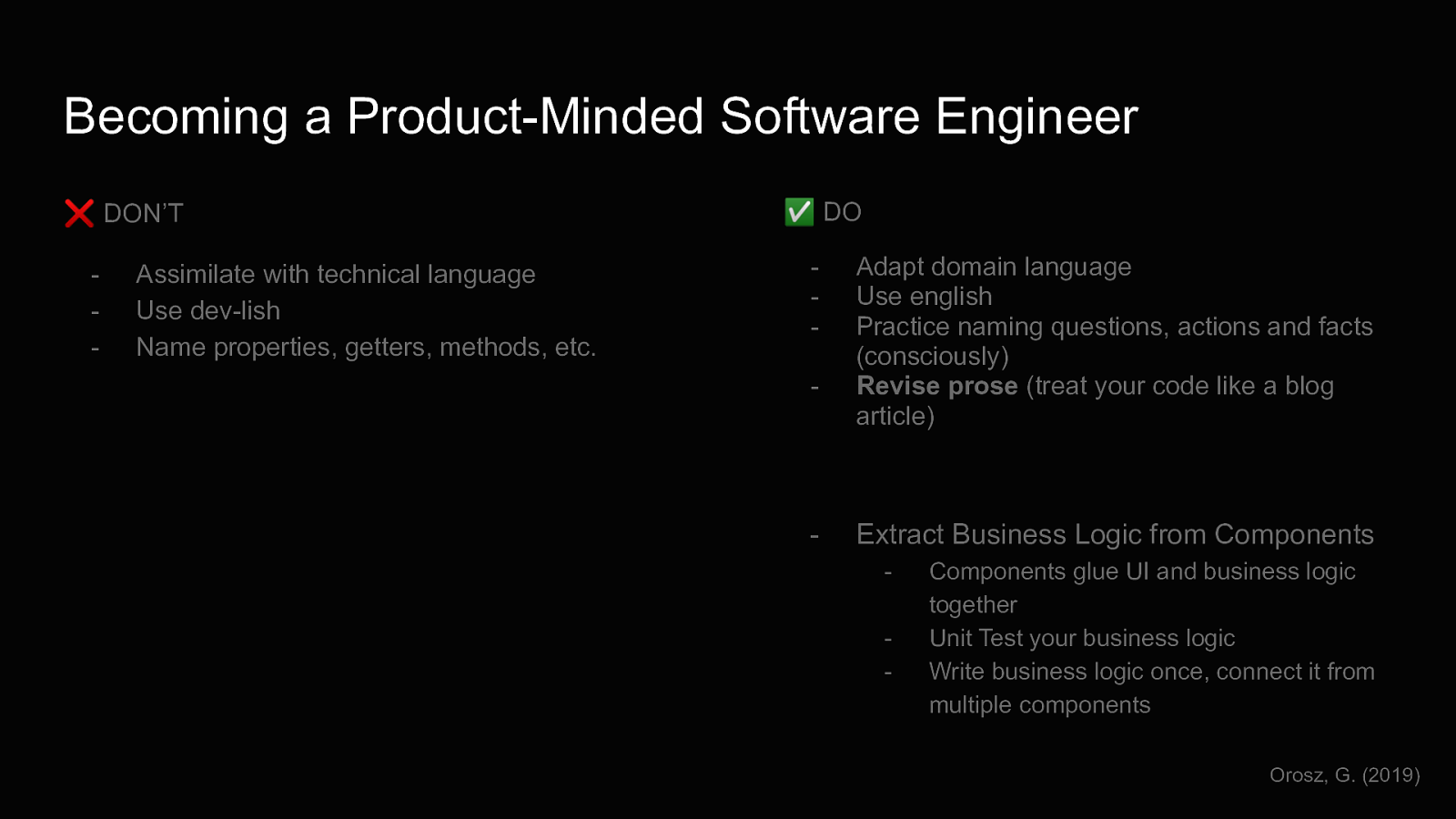
Adapt domain language Use english Practice naming questions, actions and facts (consciously) Revise prose (treat your code like a blog article) Extract Business Logic from Components - Components glue UI and business logic together Unit Test your business logic Write business logic once, connect it from multiple components Orosz, G. (2019)
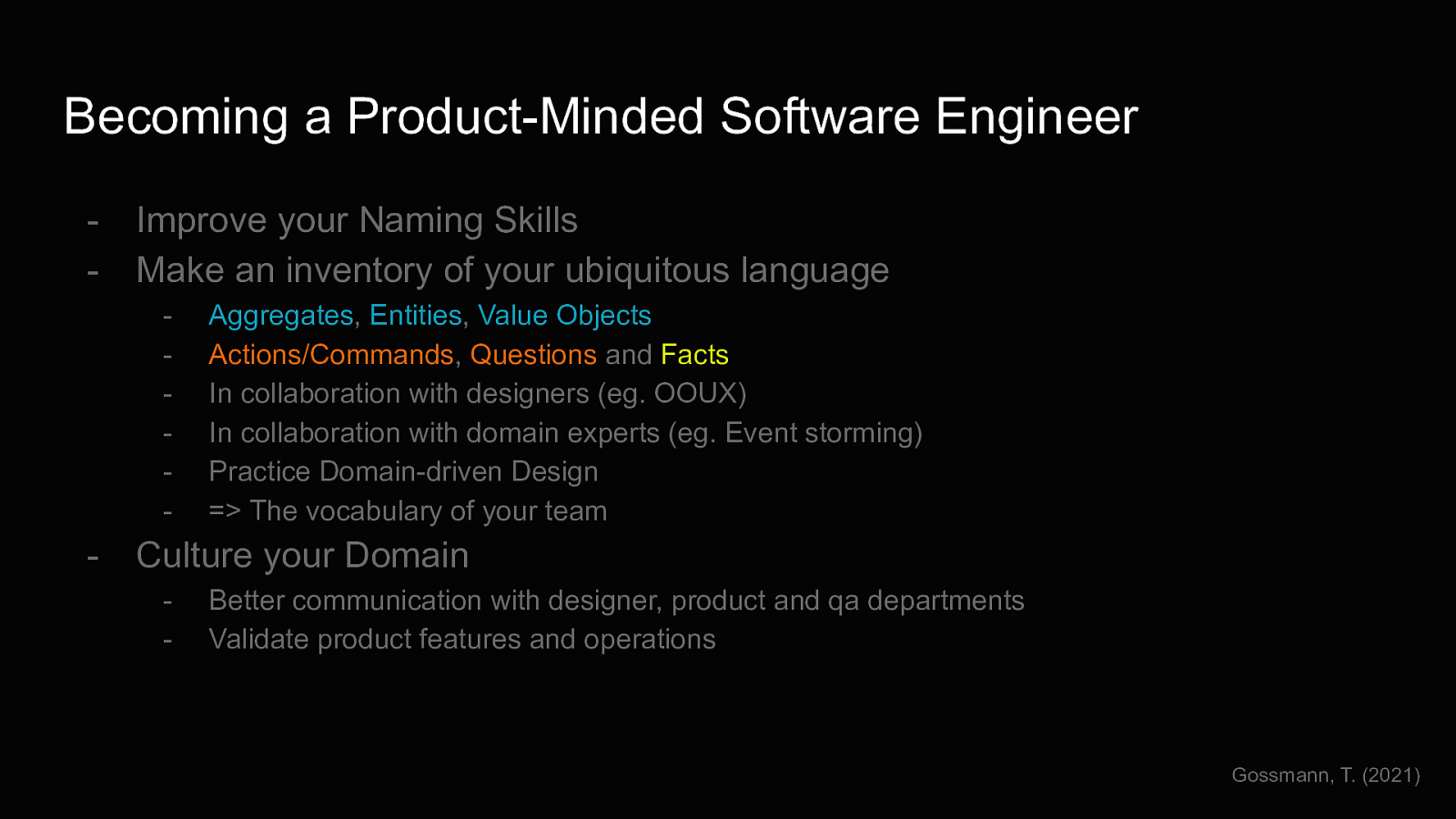
Aggregates, Entities, Value Objects Actions/Commands, Questions and Facts In collaboration with designers (eg. OOUX) In collaboration with domain experts (eg. Event storming) Practice Domain-driven Design => The vocabulary of your team Culture your Domain - Better communication with designer, product and qa departments Validate product features and operations Gossmann, T. (2021)

References - Gossmann, T. (2021). The Hidden Skill and Art of Naming Things. https://gos.si/blog/the-hidden-skill-and-art-of-naming-things/. Orosz, G. (2019). The Product-Minded Software Engineer. https://blog.pragmaticengineer.com/the-product-minded-engineer. Pavlutin, D. (2019). Coding like Shakespeare: Practical Function Naming Conventions. https://dmitripavlutin.com/coding-like-shakespeare-practical-function-naming-conventions/. Roden, G. (2022a). CRUD? Bloß nicht! // deutsch. https://www.youtube.com/watch?v=MoWynuslbBY. Roden, G. (2022b). HTTP-Statuscodes: Alle benutzen sie falsch?! // deutsch. https://www.youtube.com/watch?v=2ZOFCl3E-_c Yegge, S. (2006). Execution in the Kingdom of Nouns. https://steve-yegge.blogspot.com/2006/03/execution-in-kingdom-of-nouns.html.

Thank you!